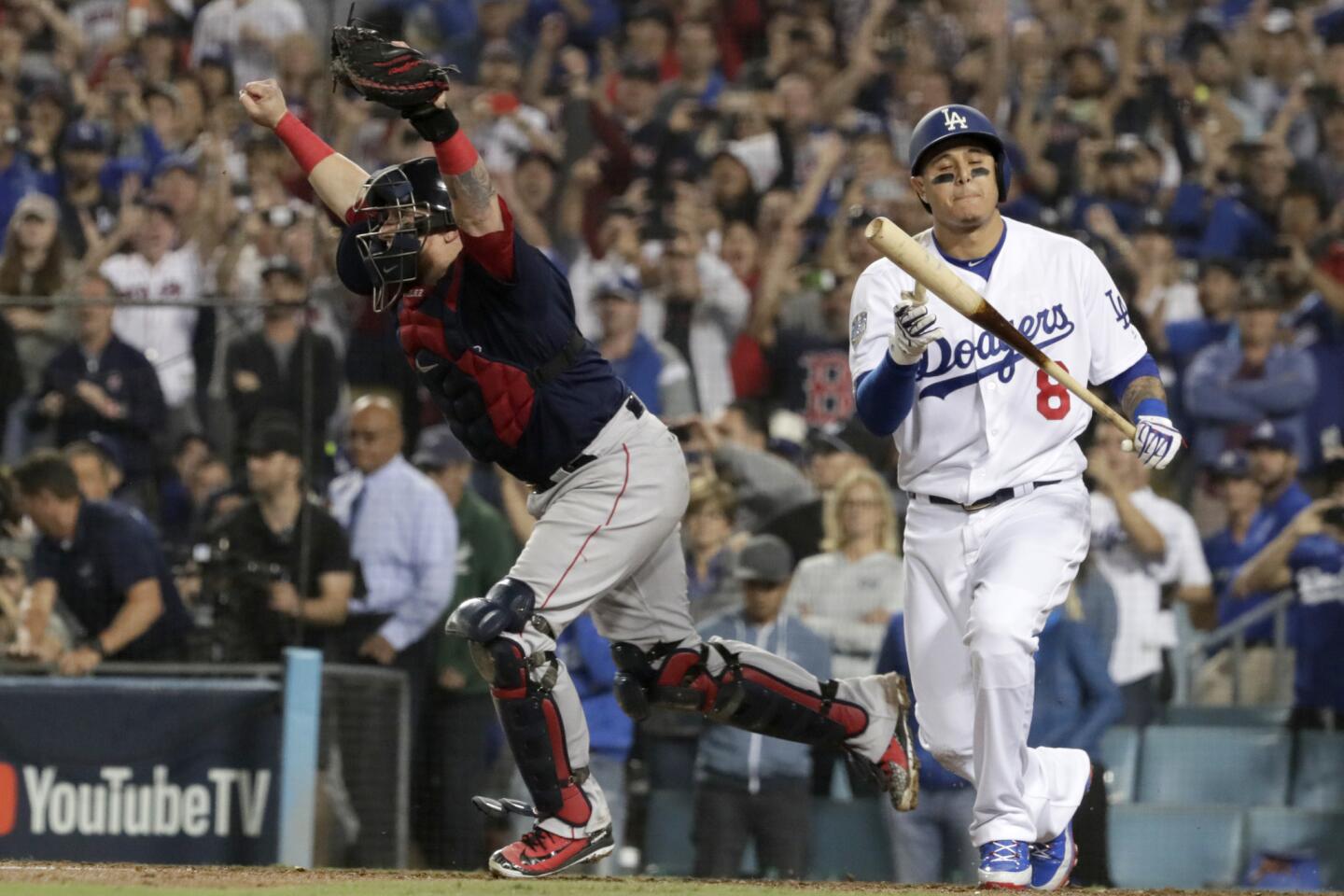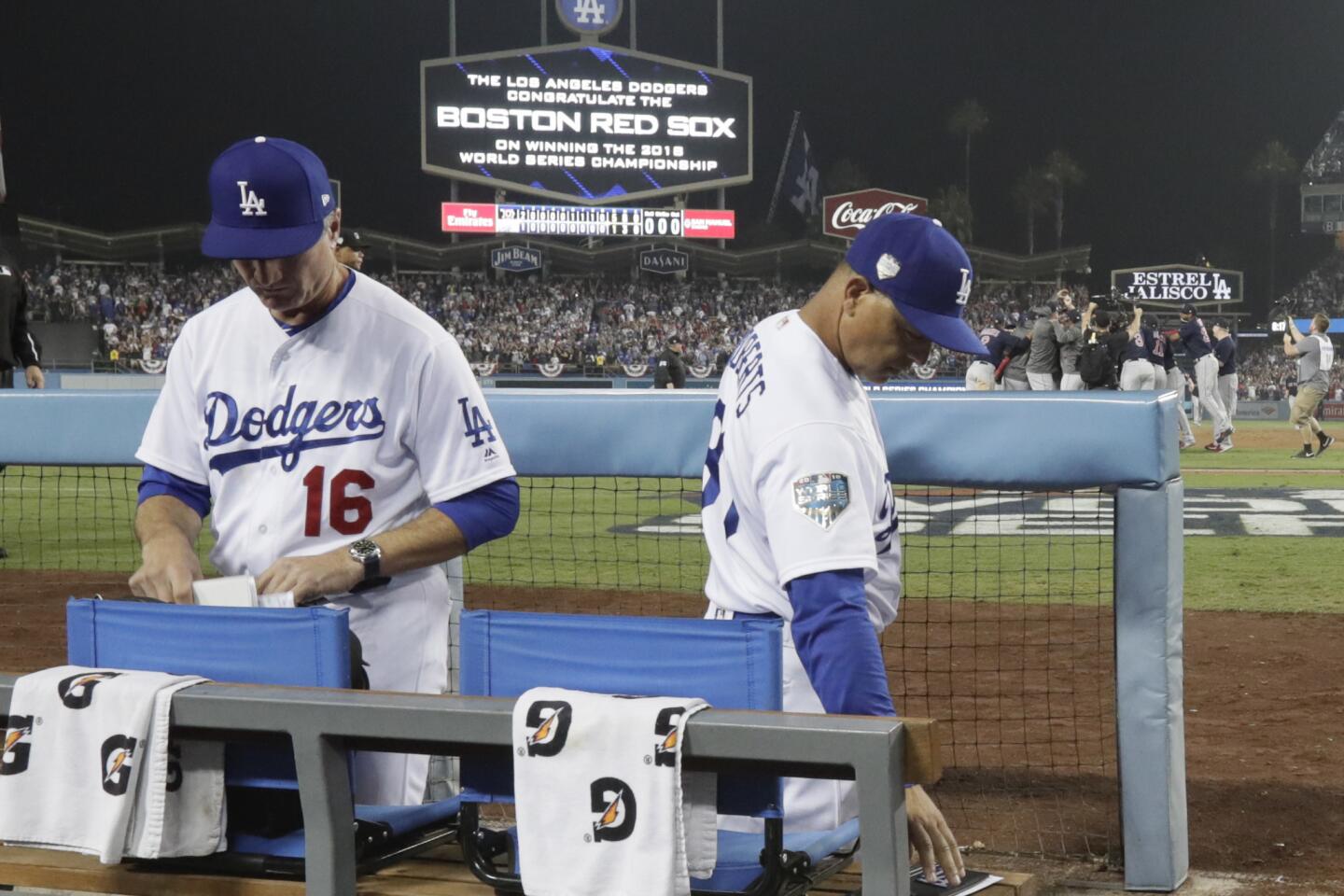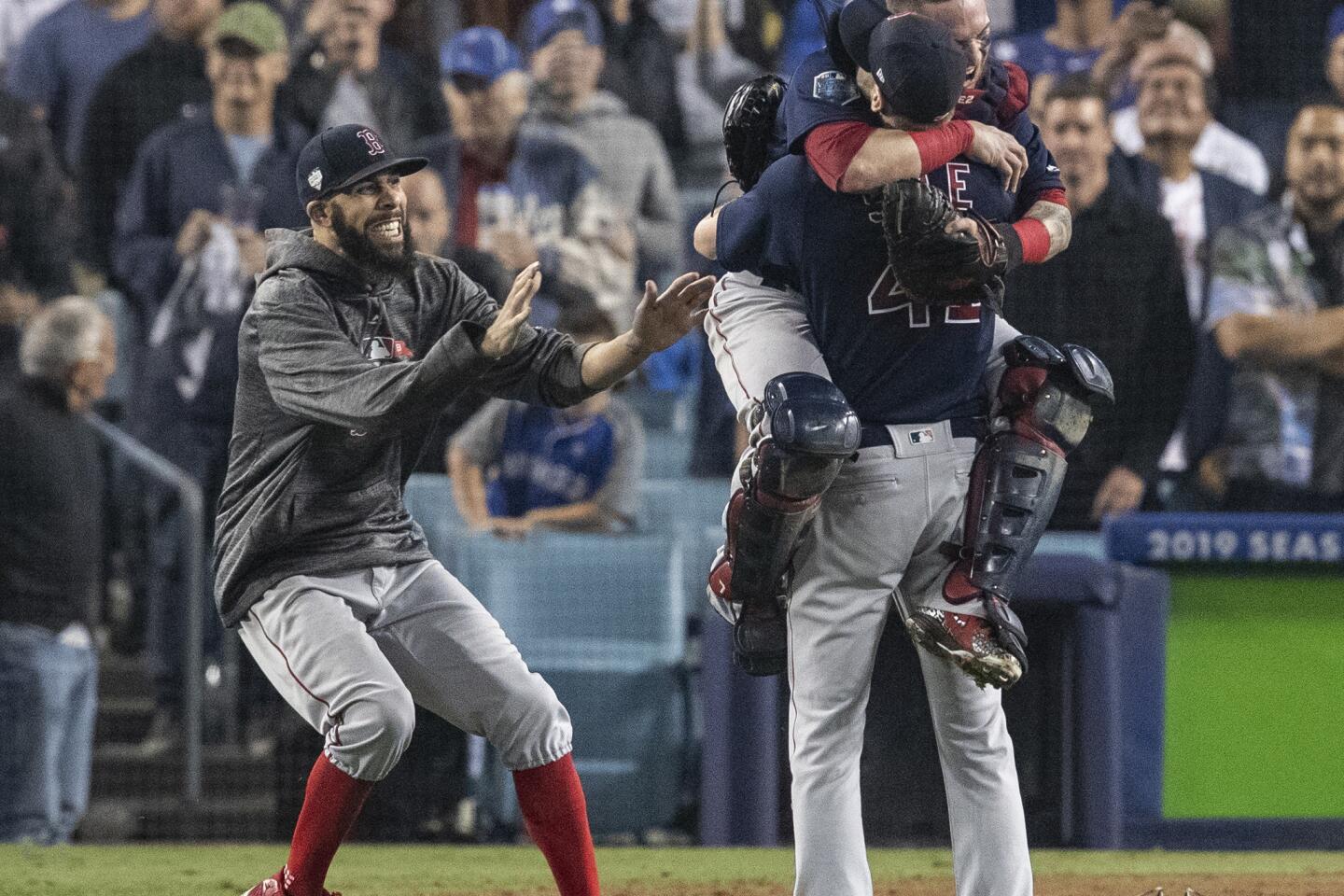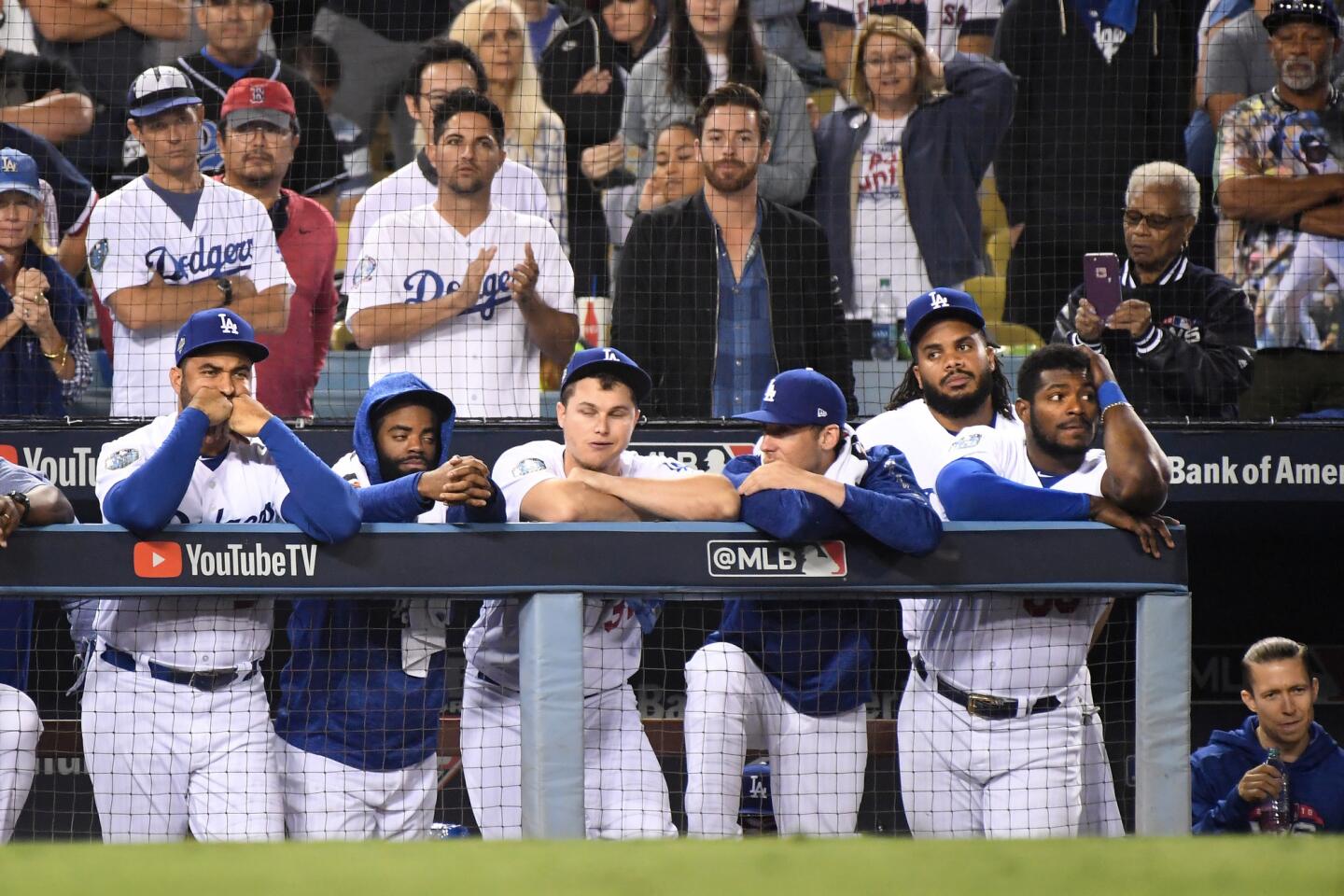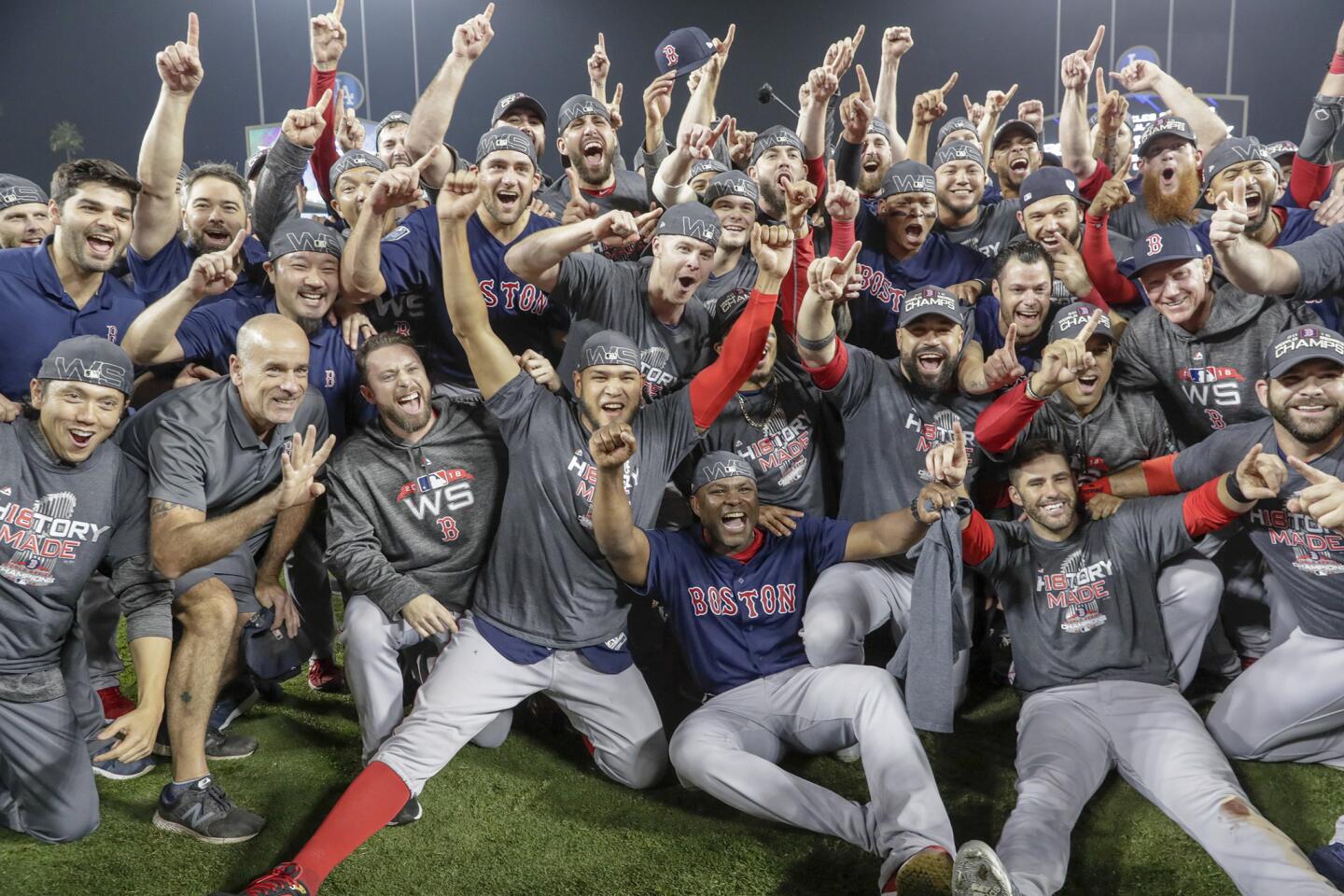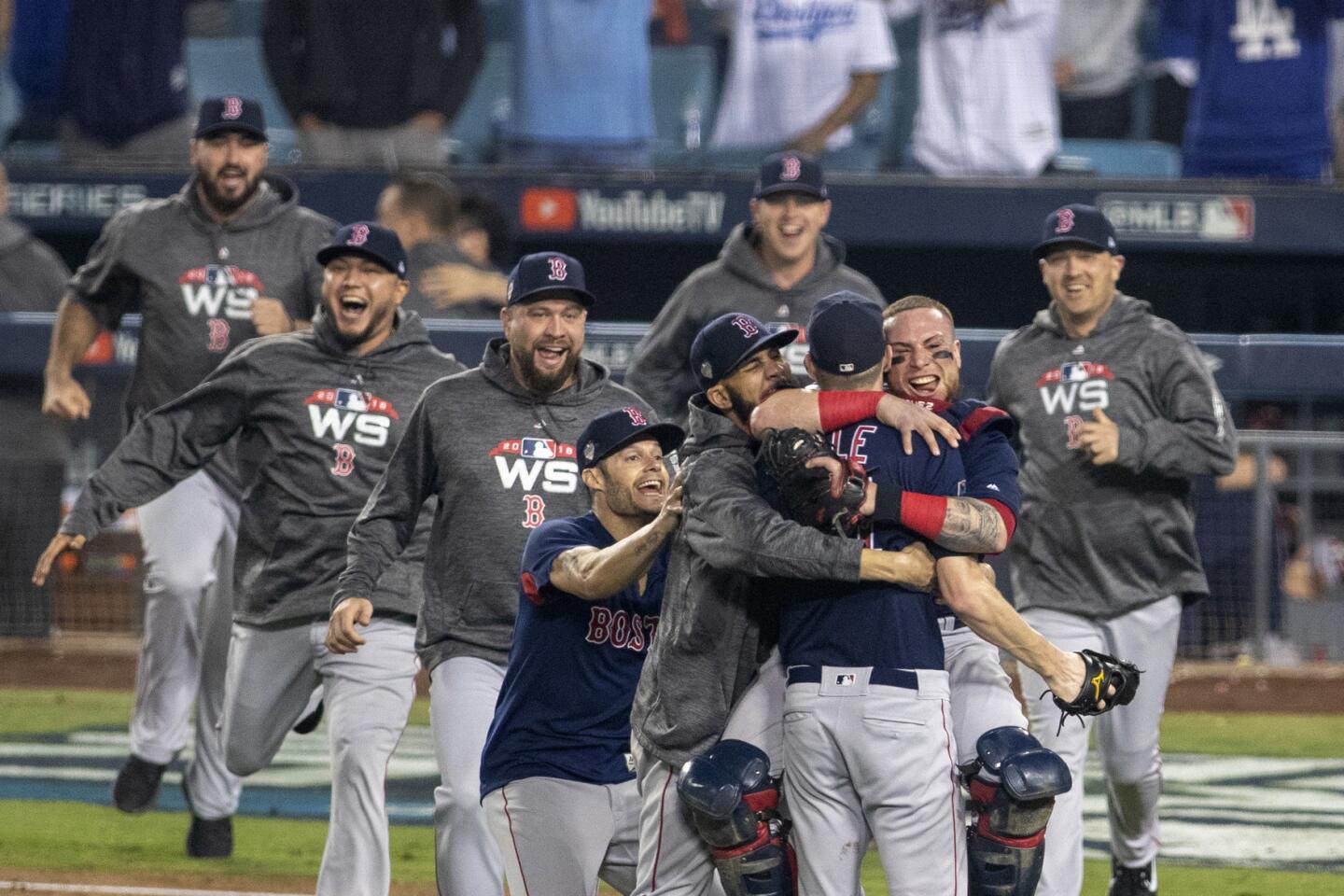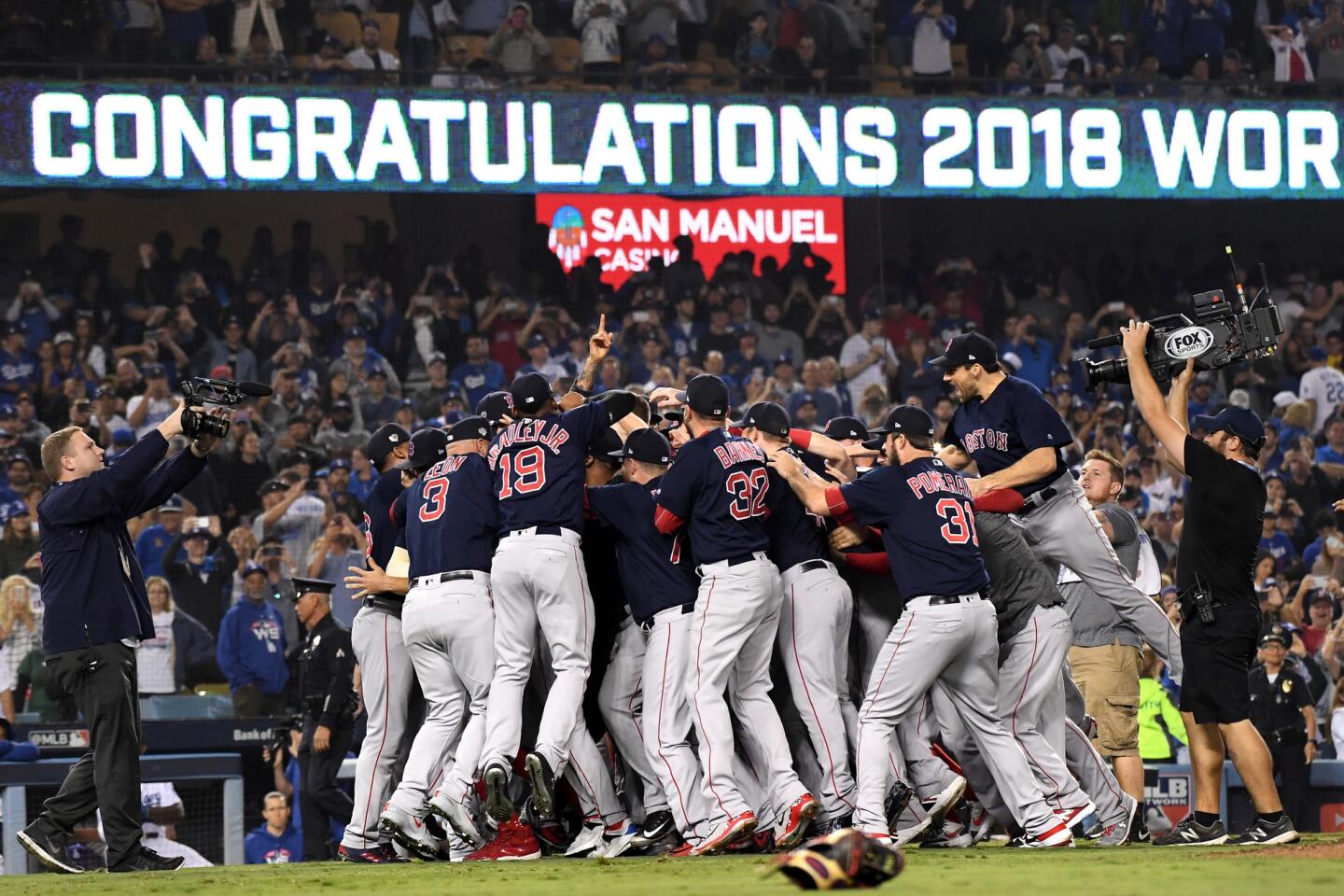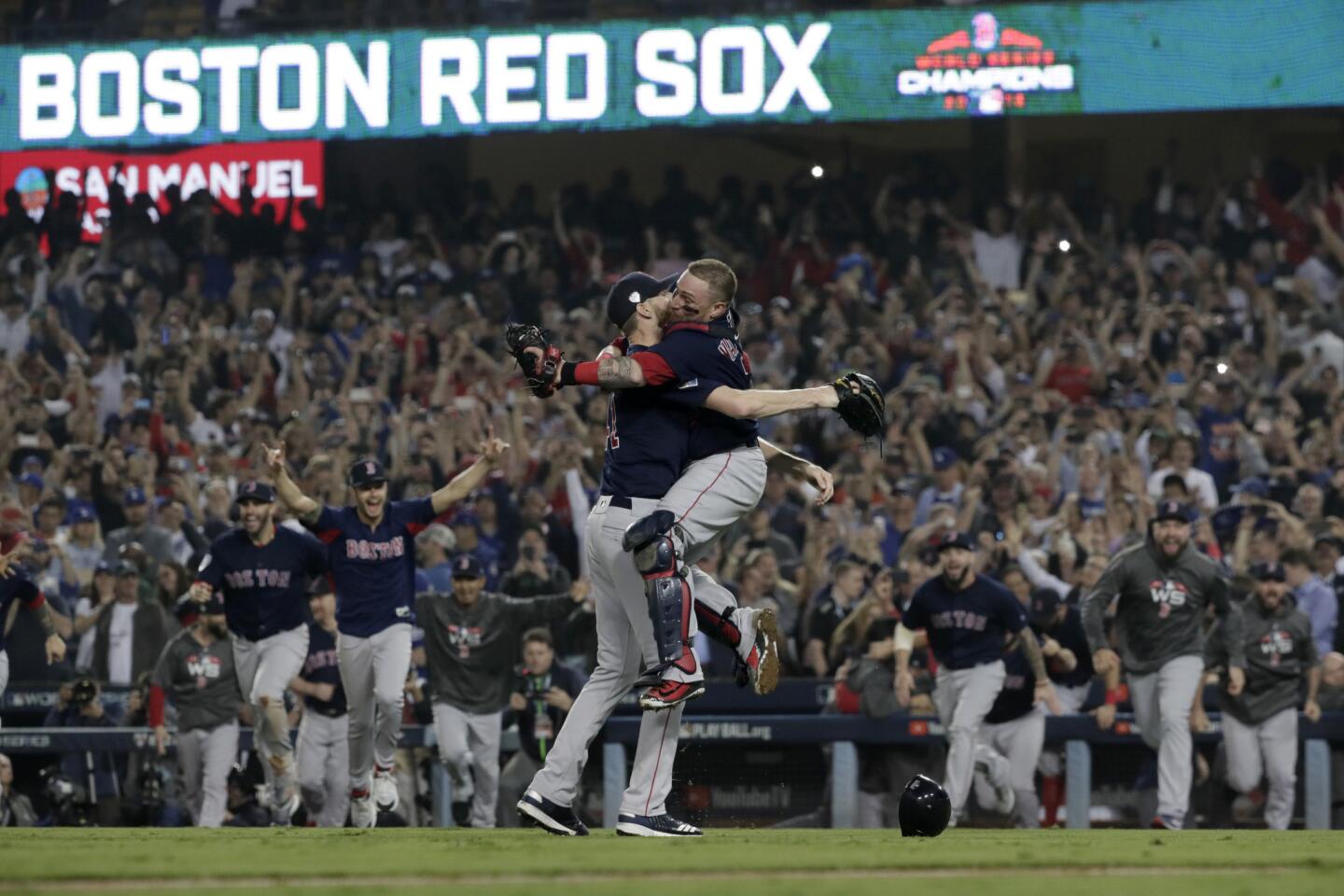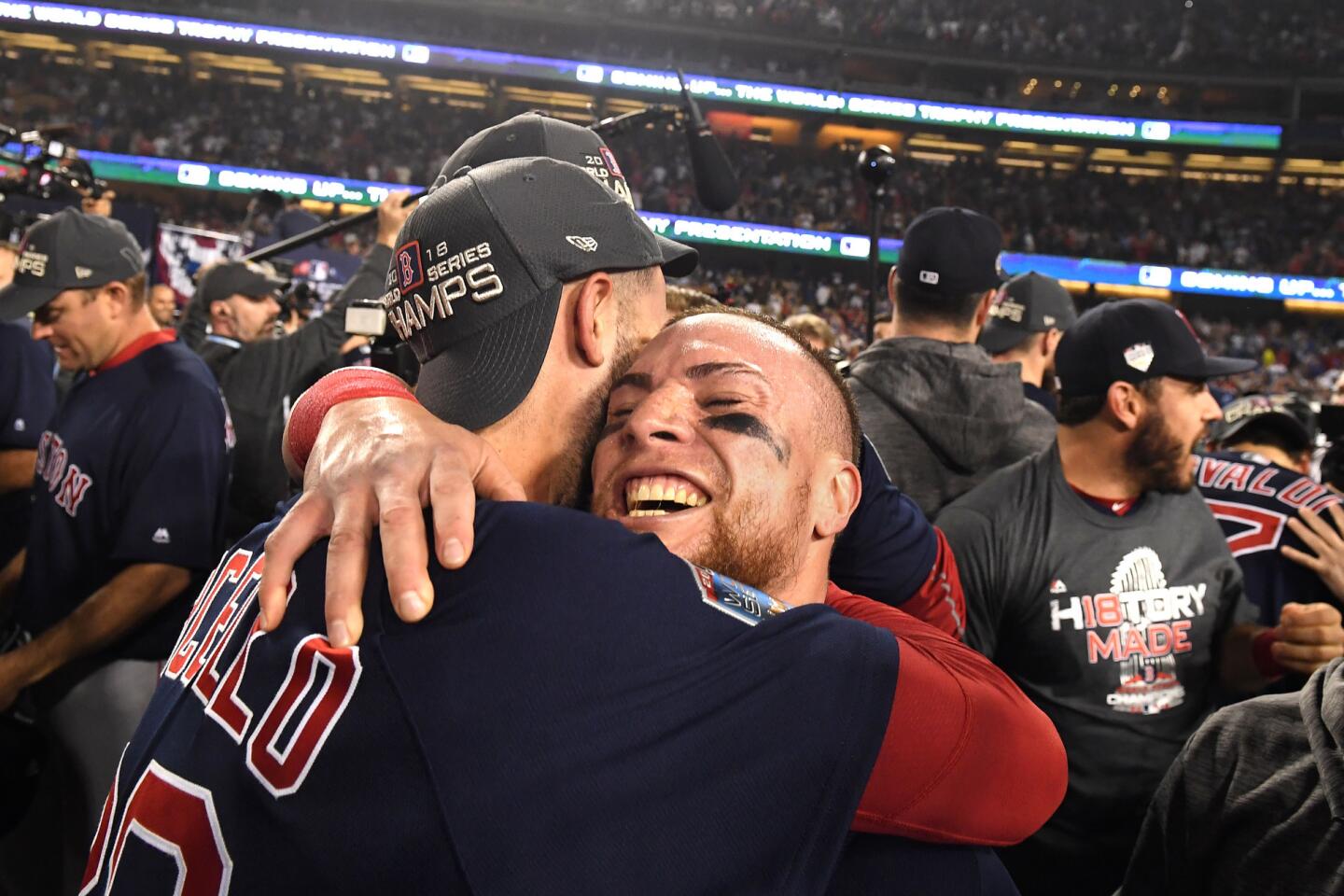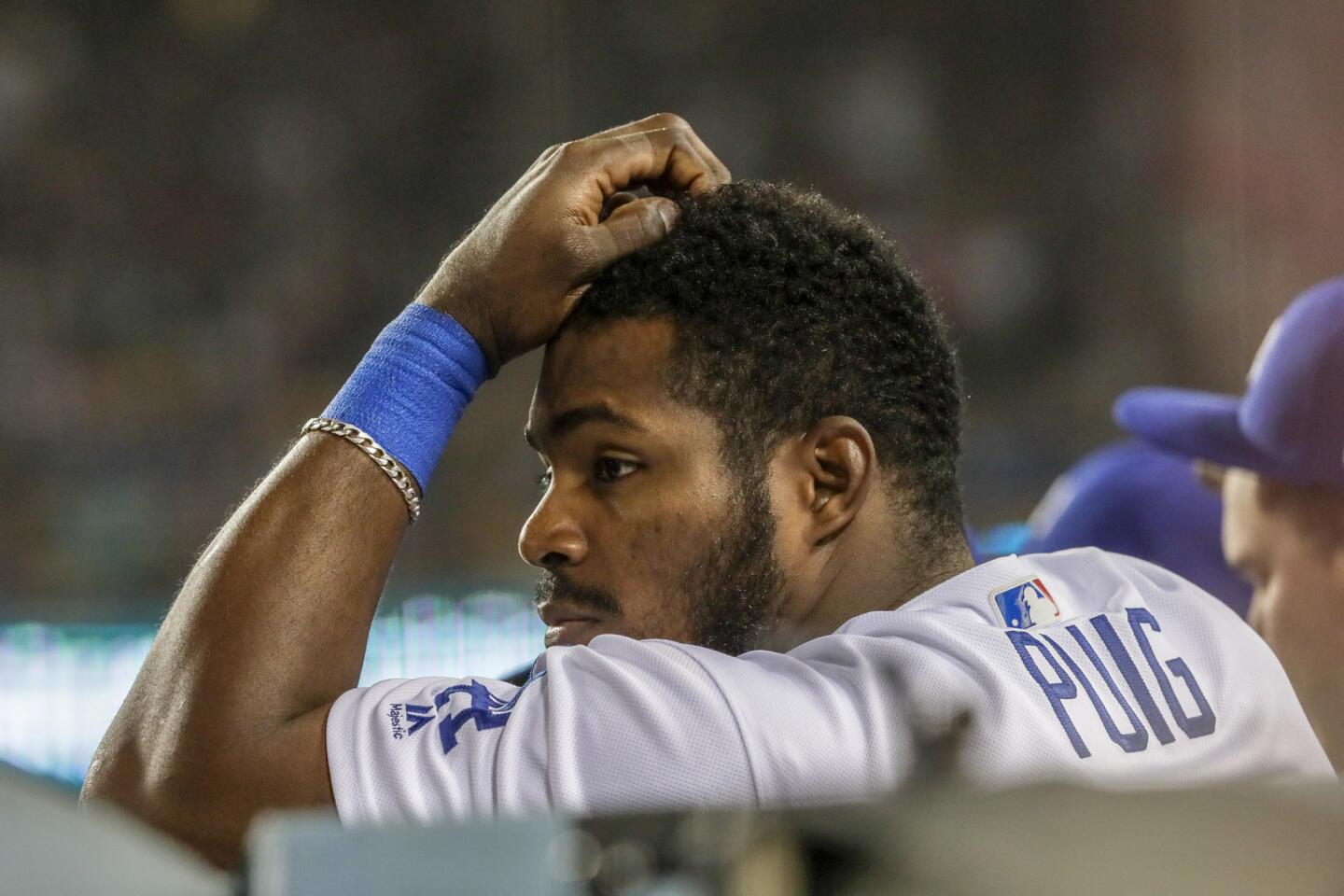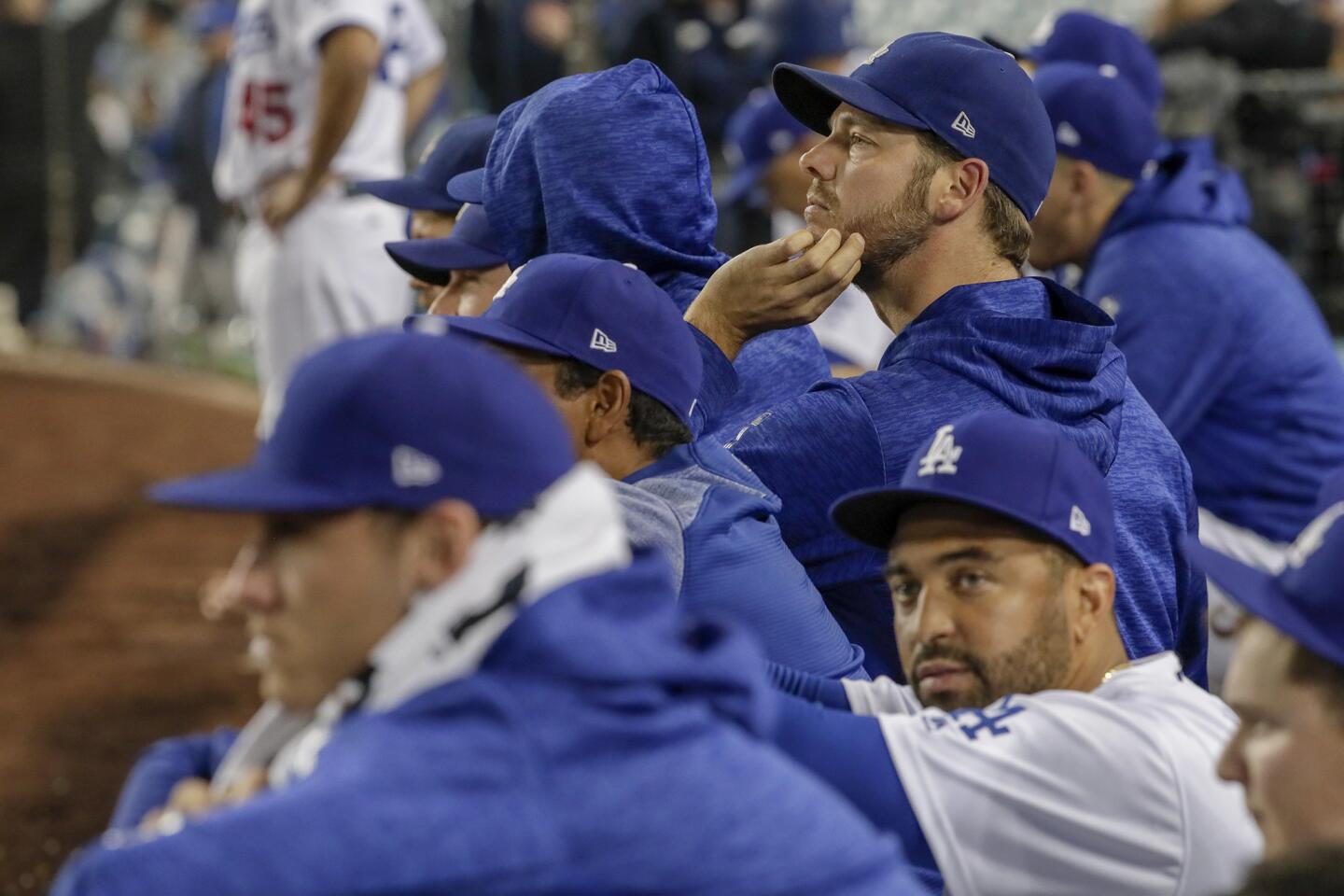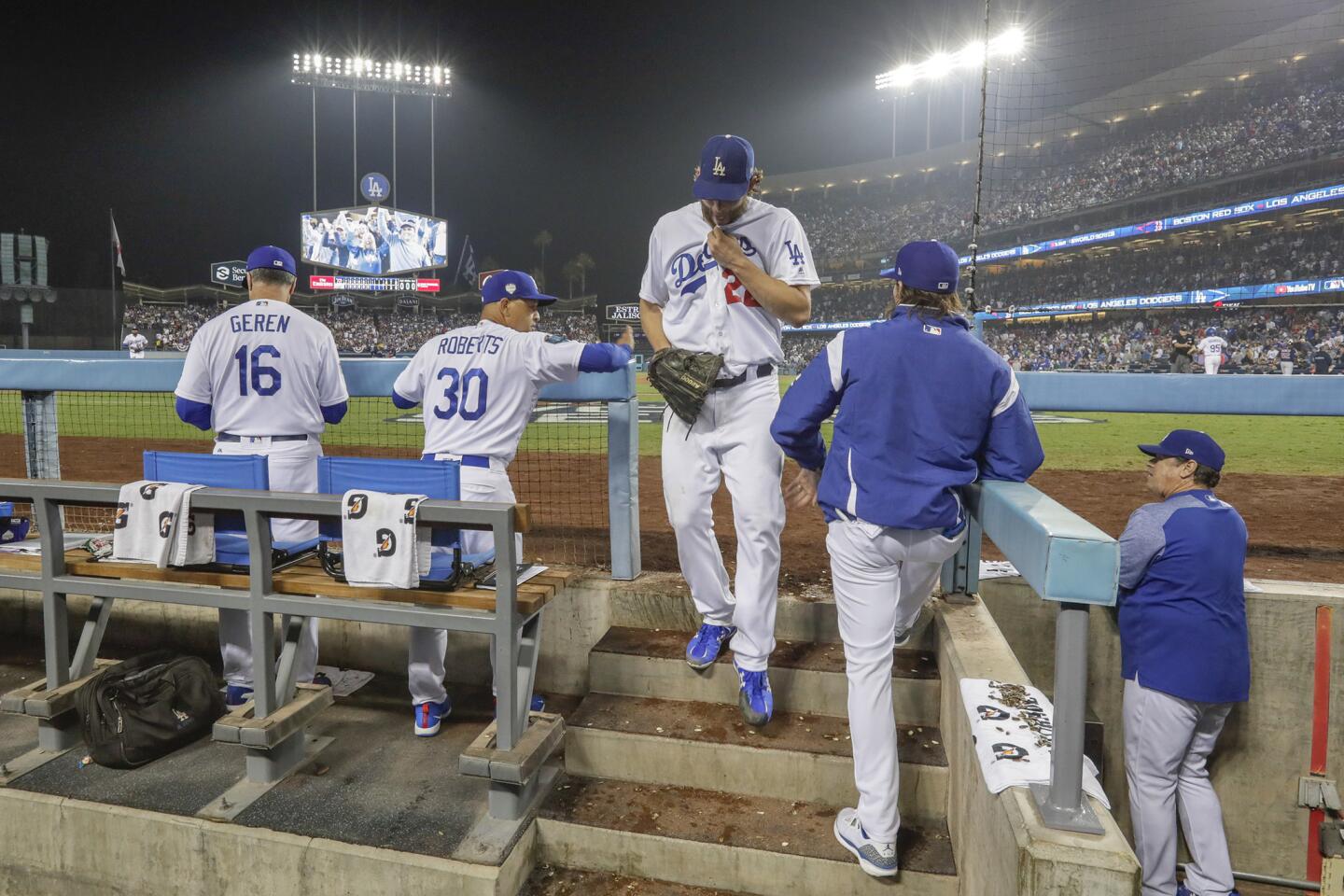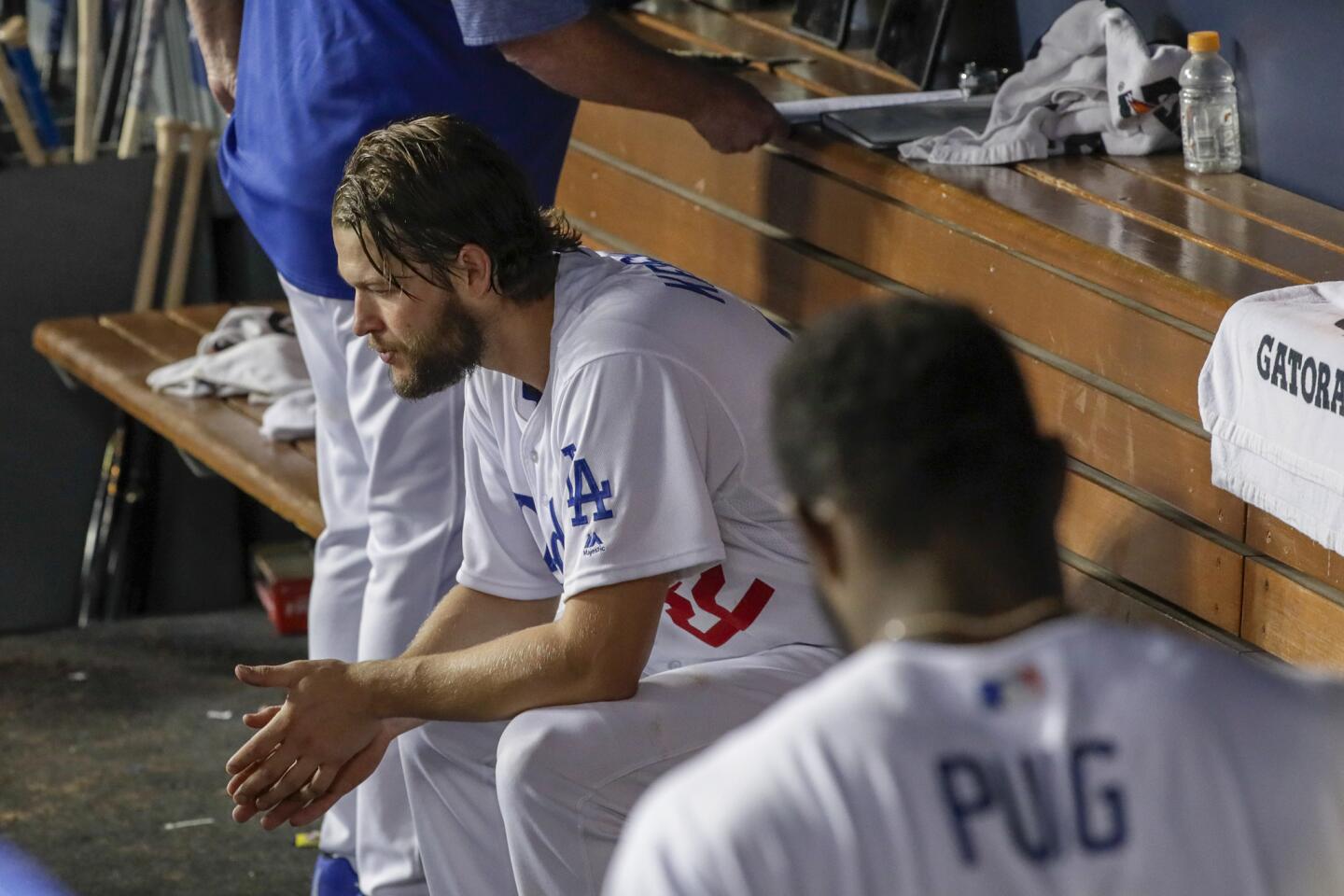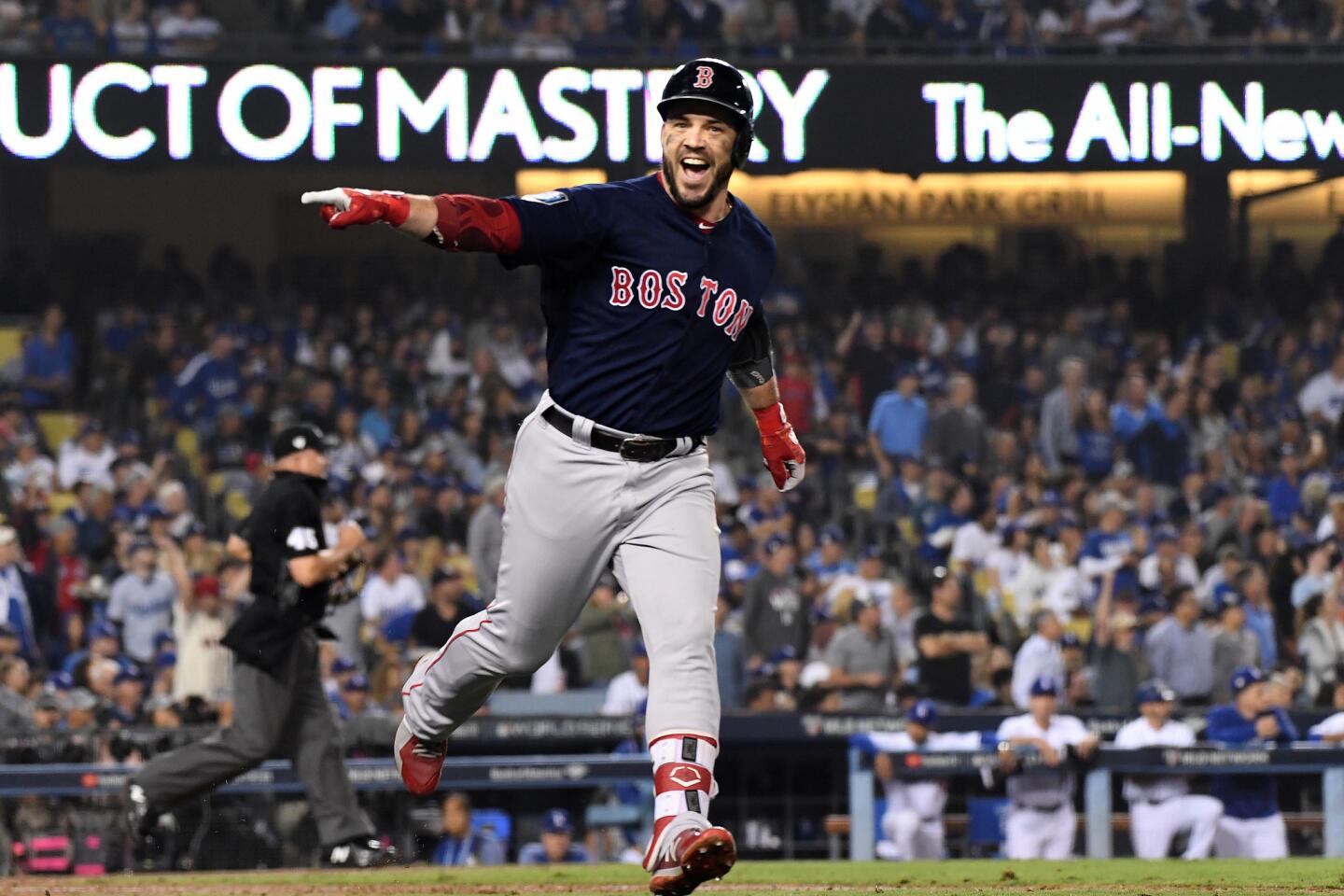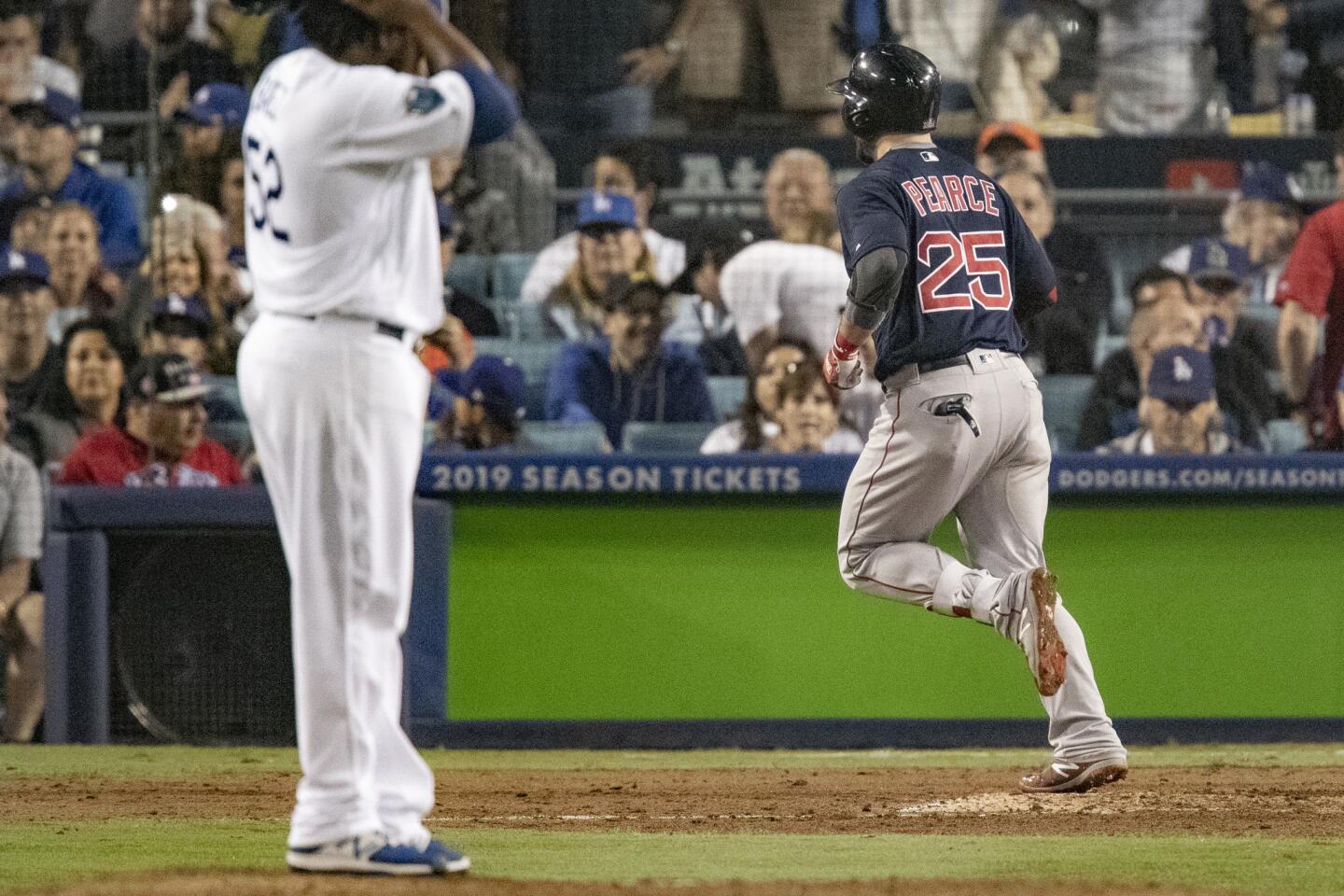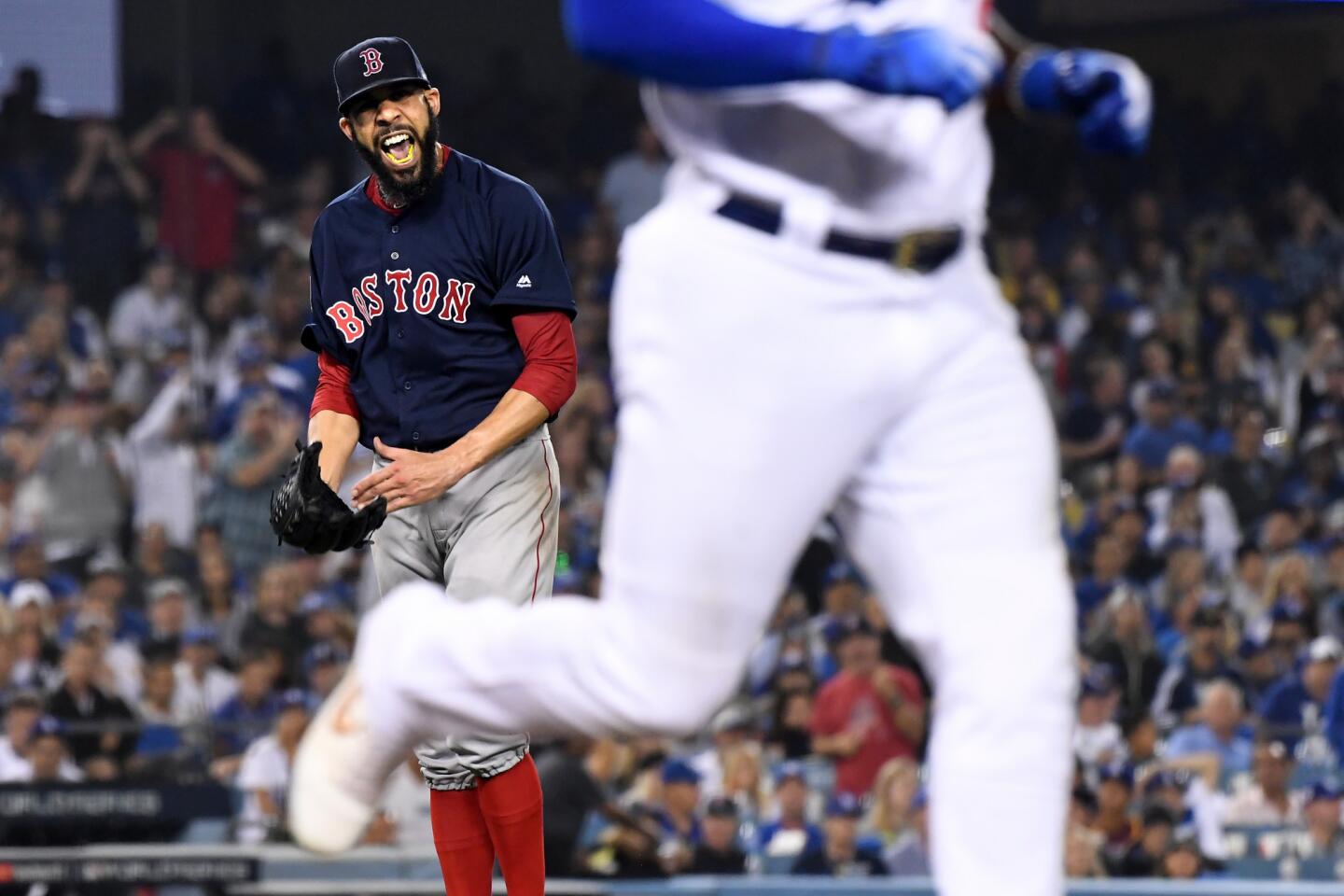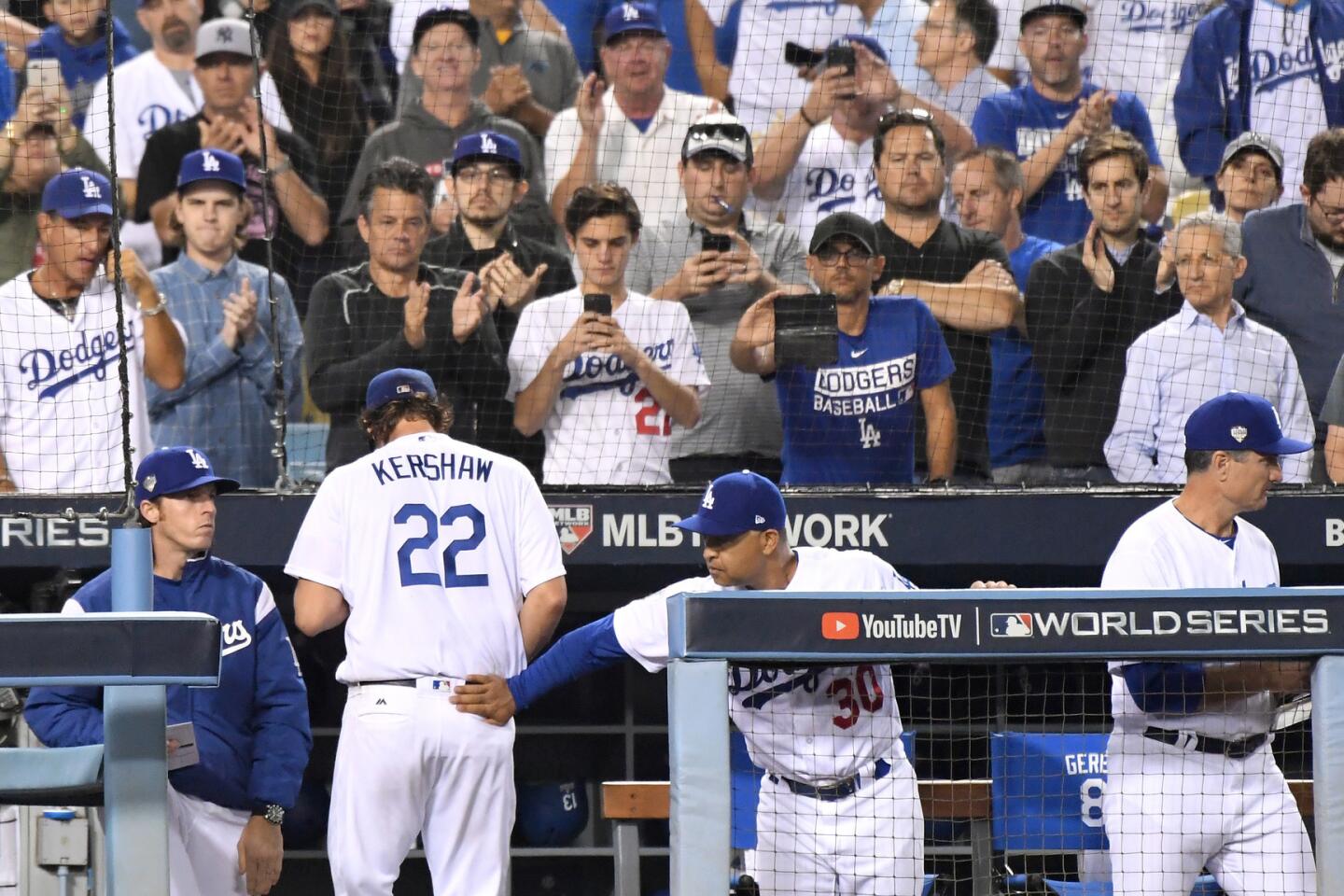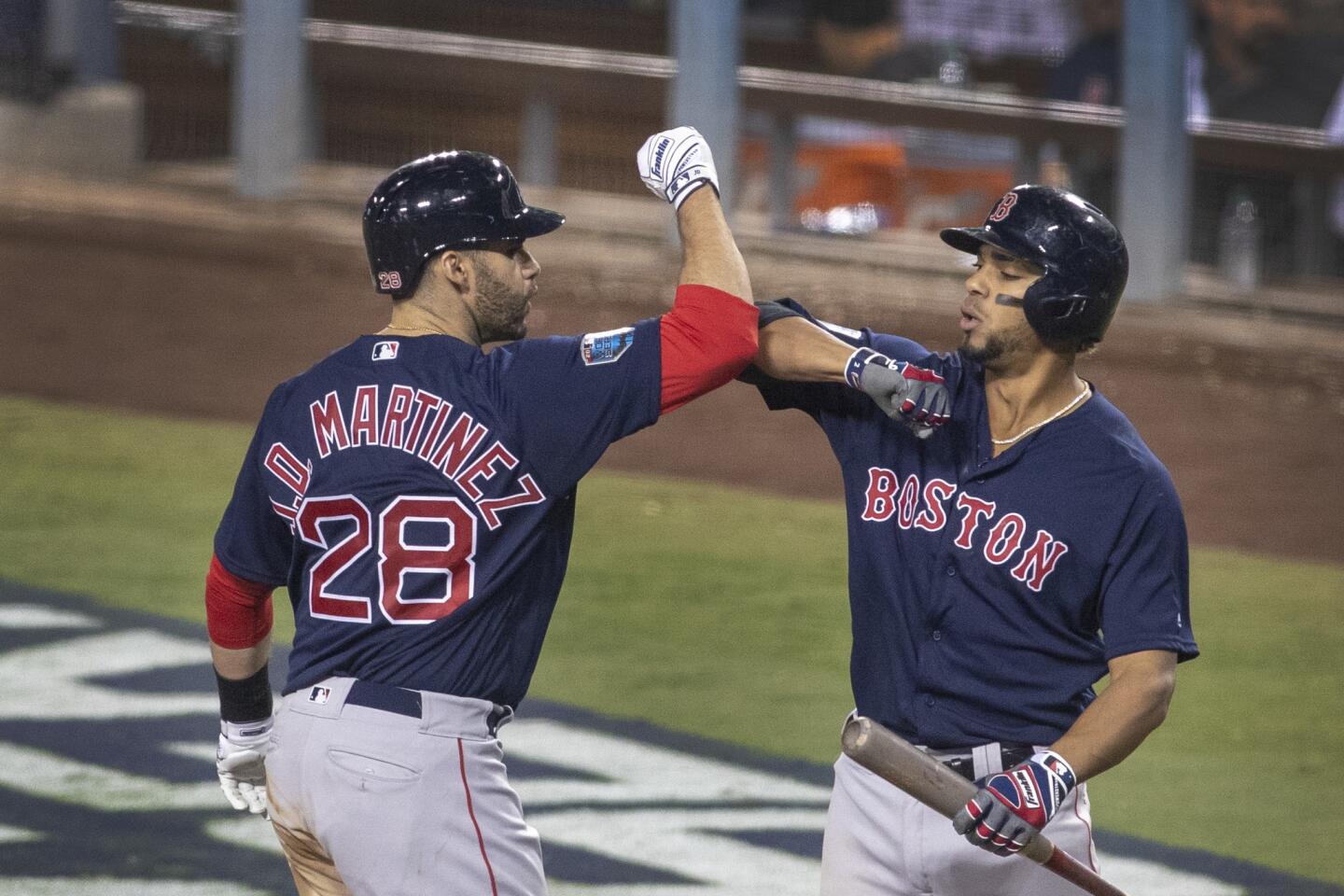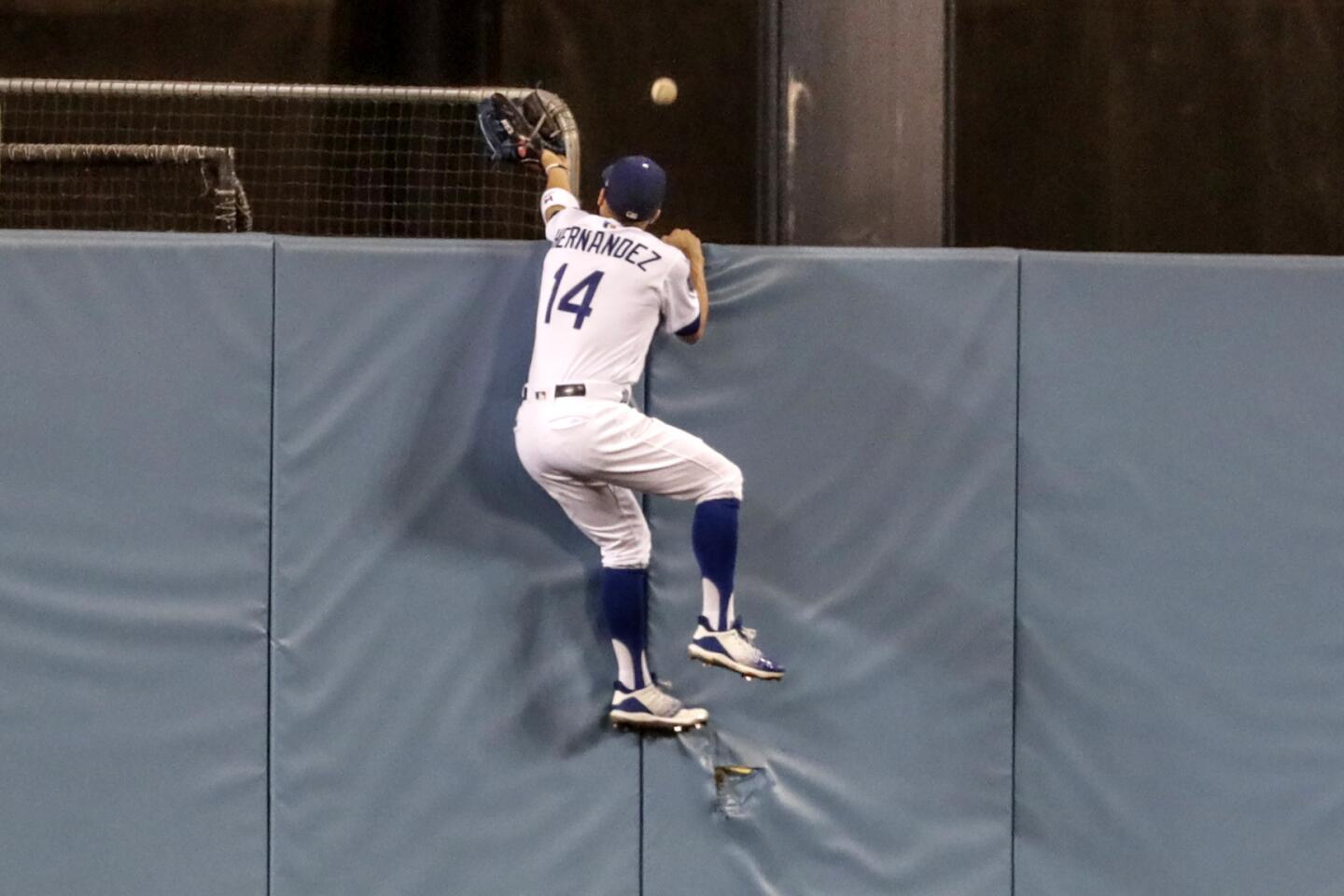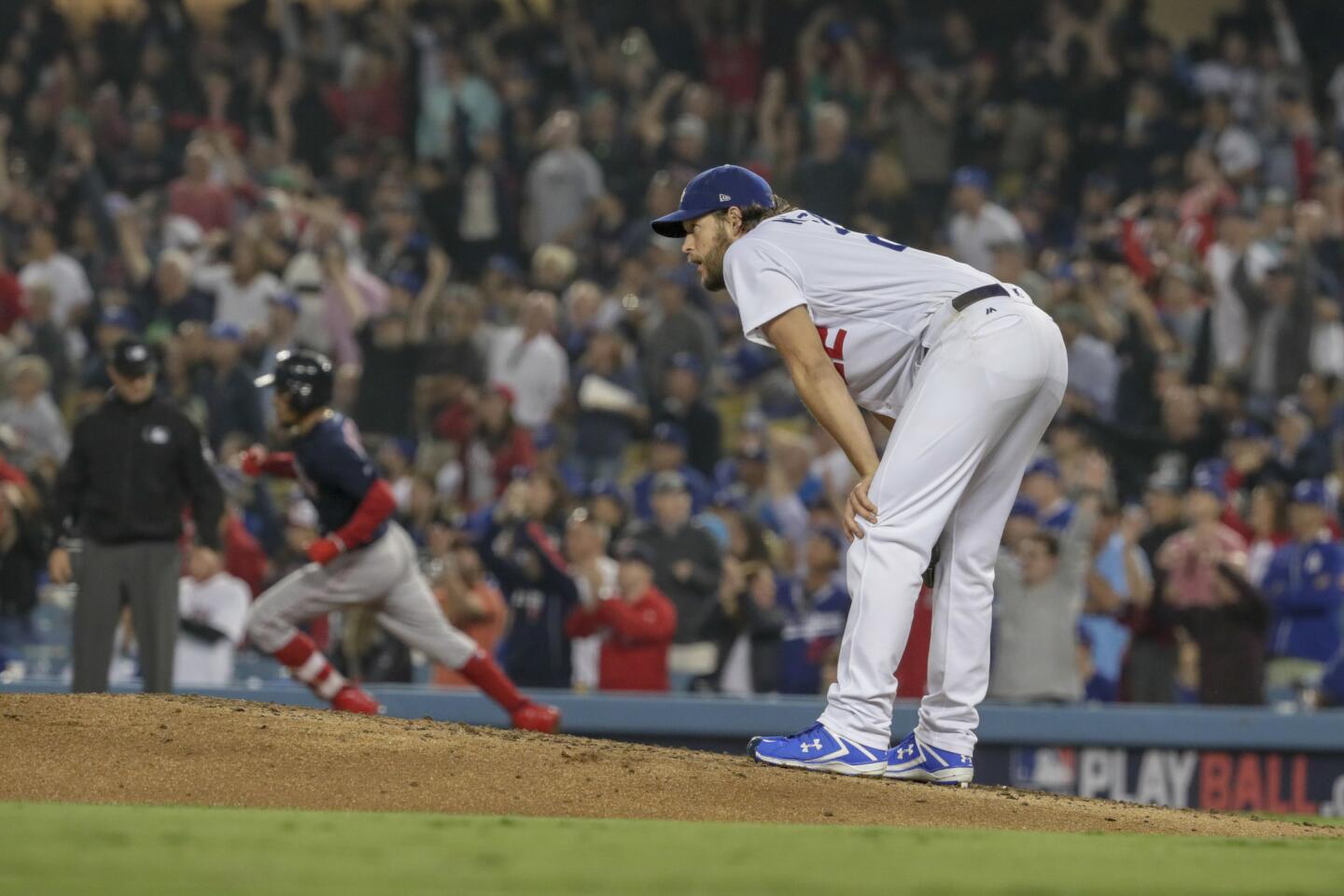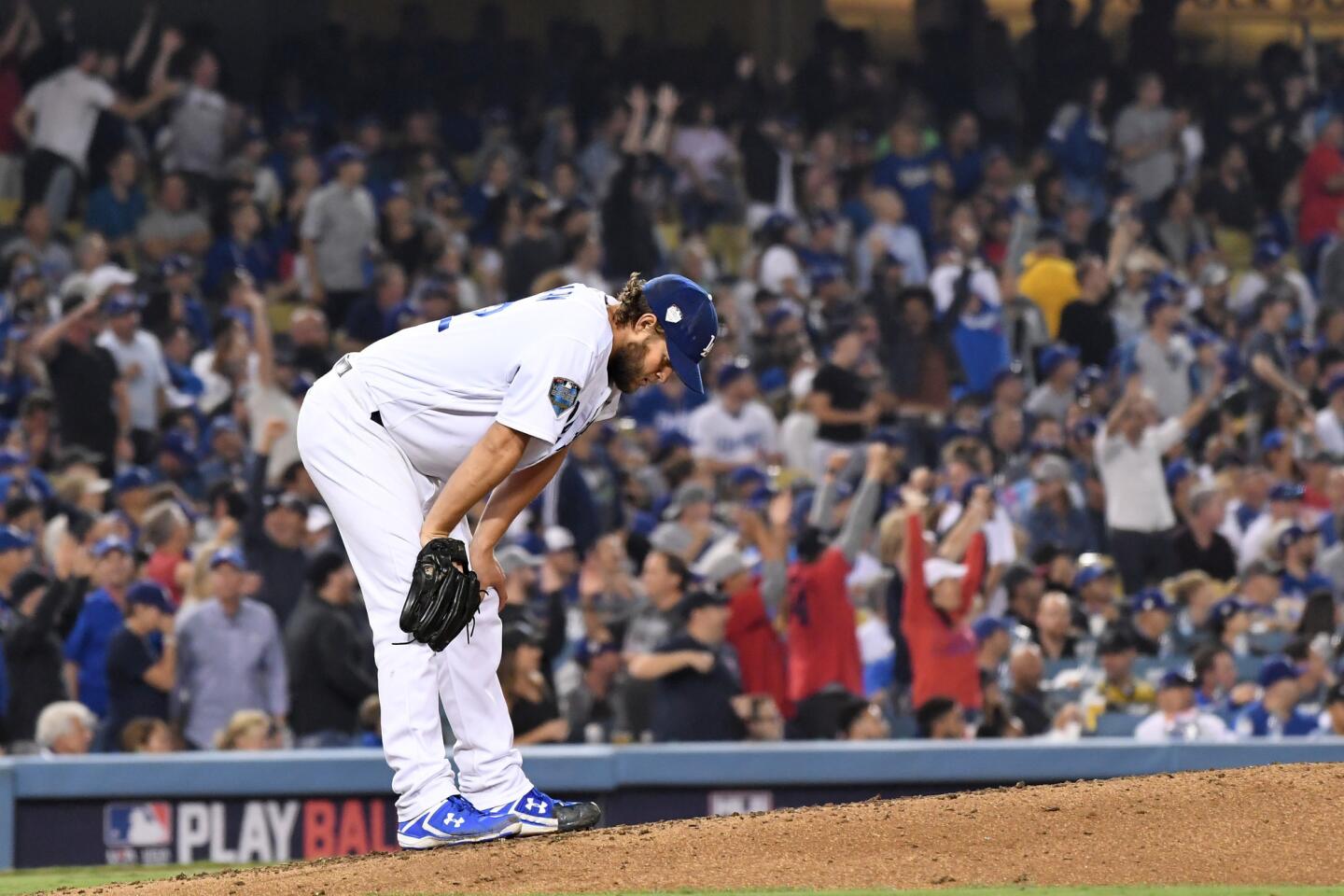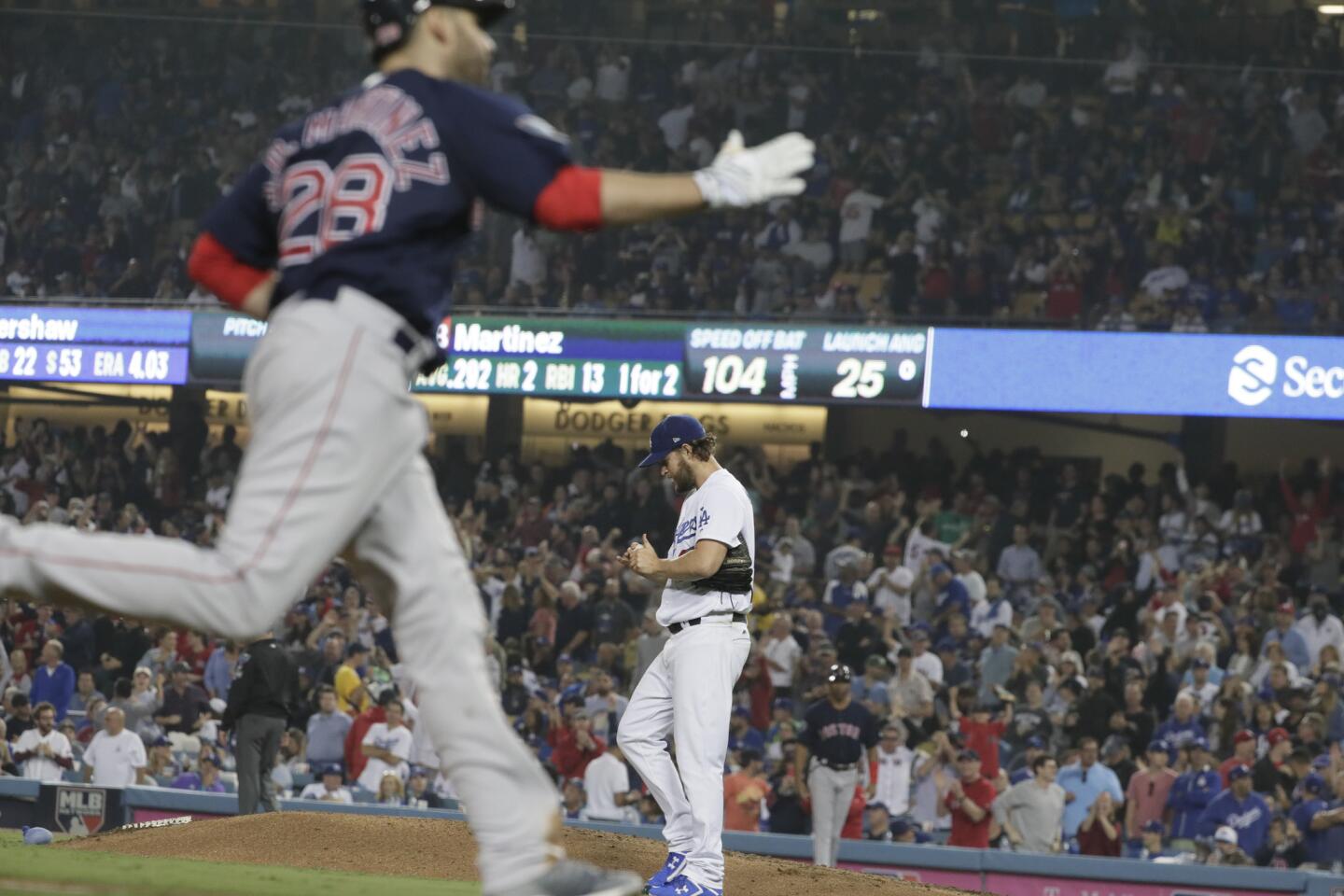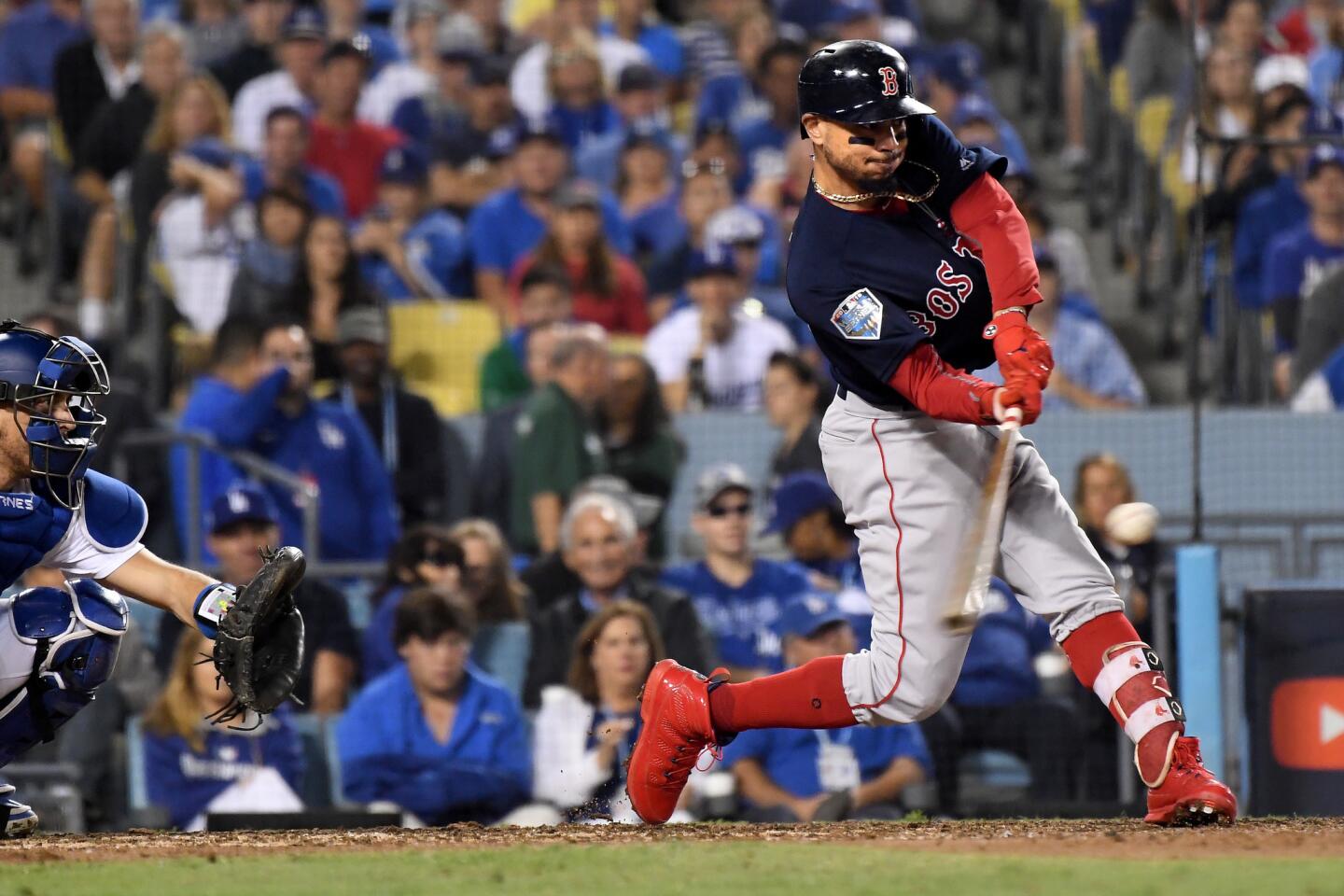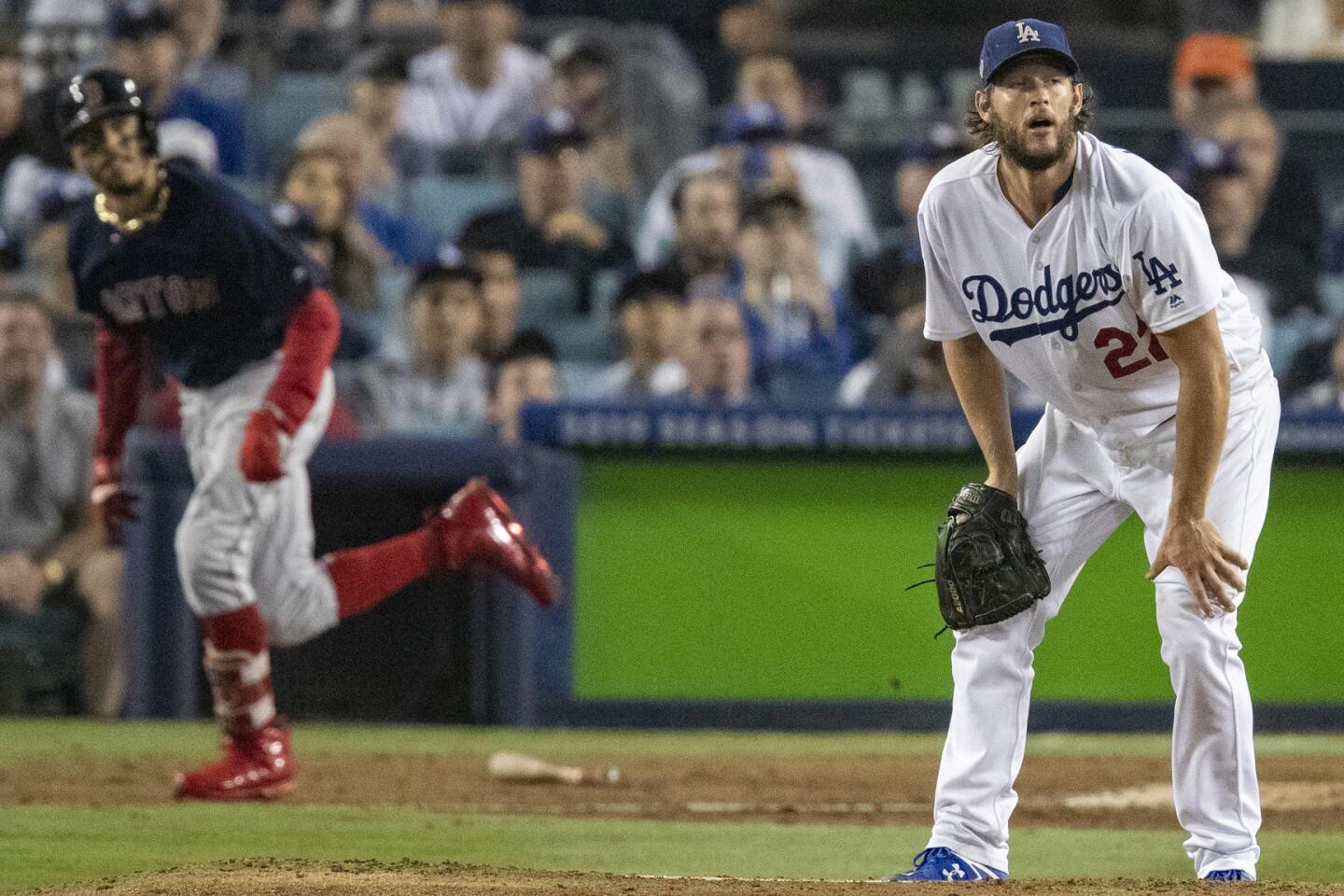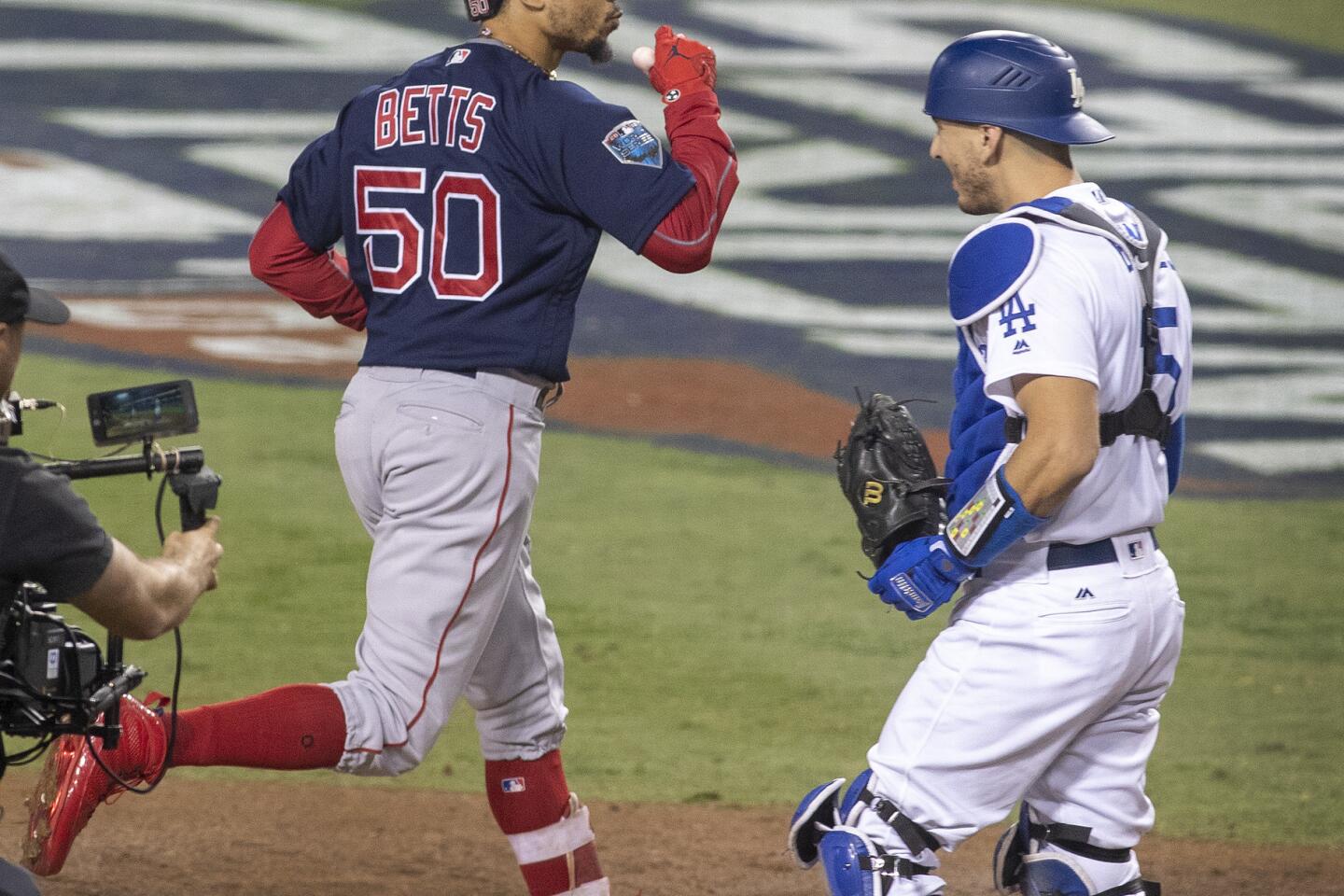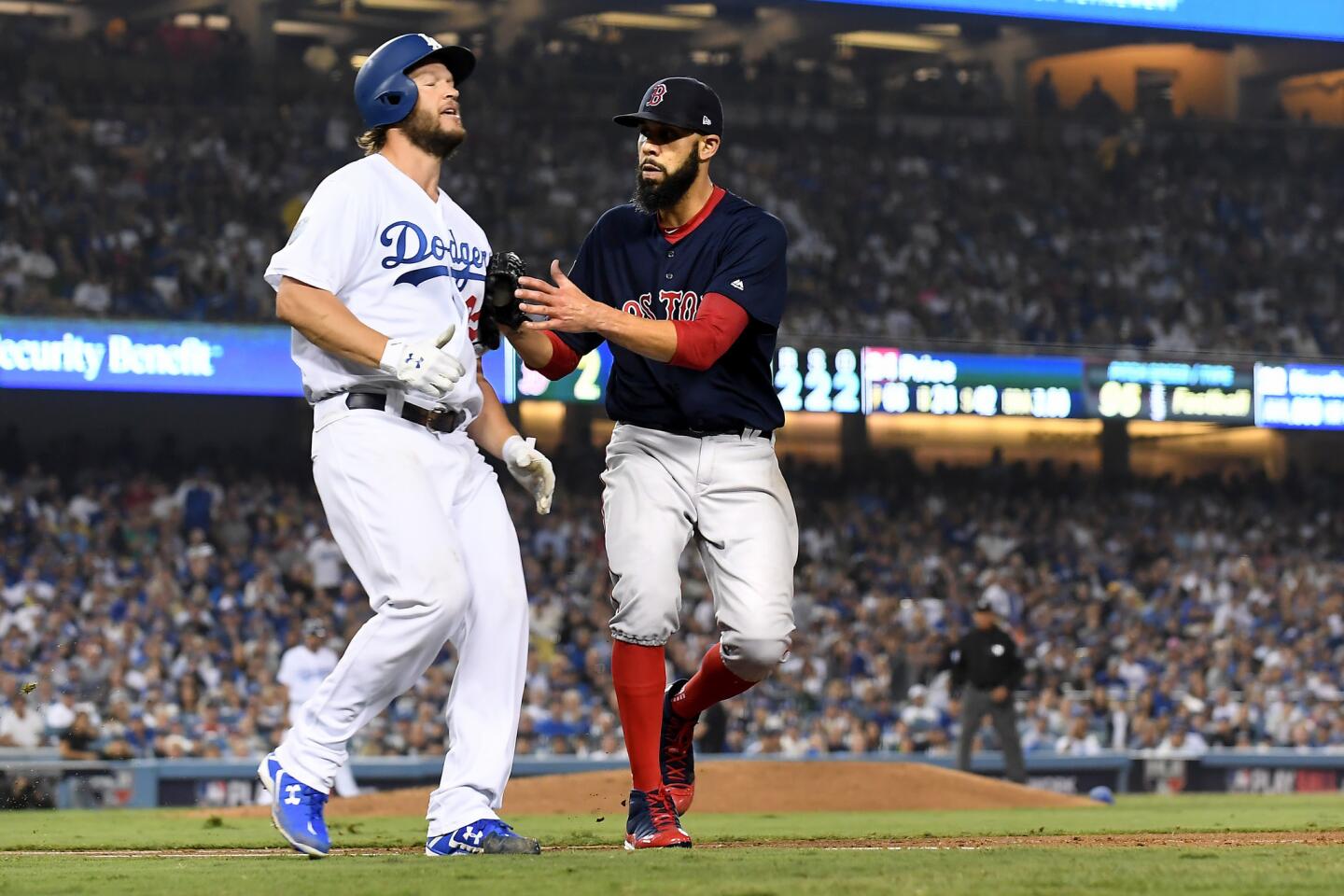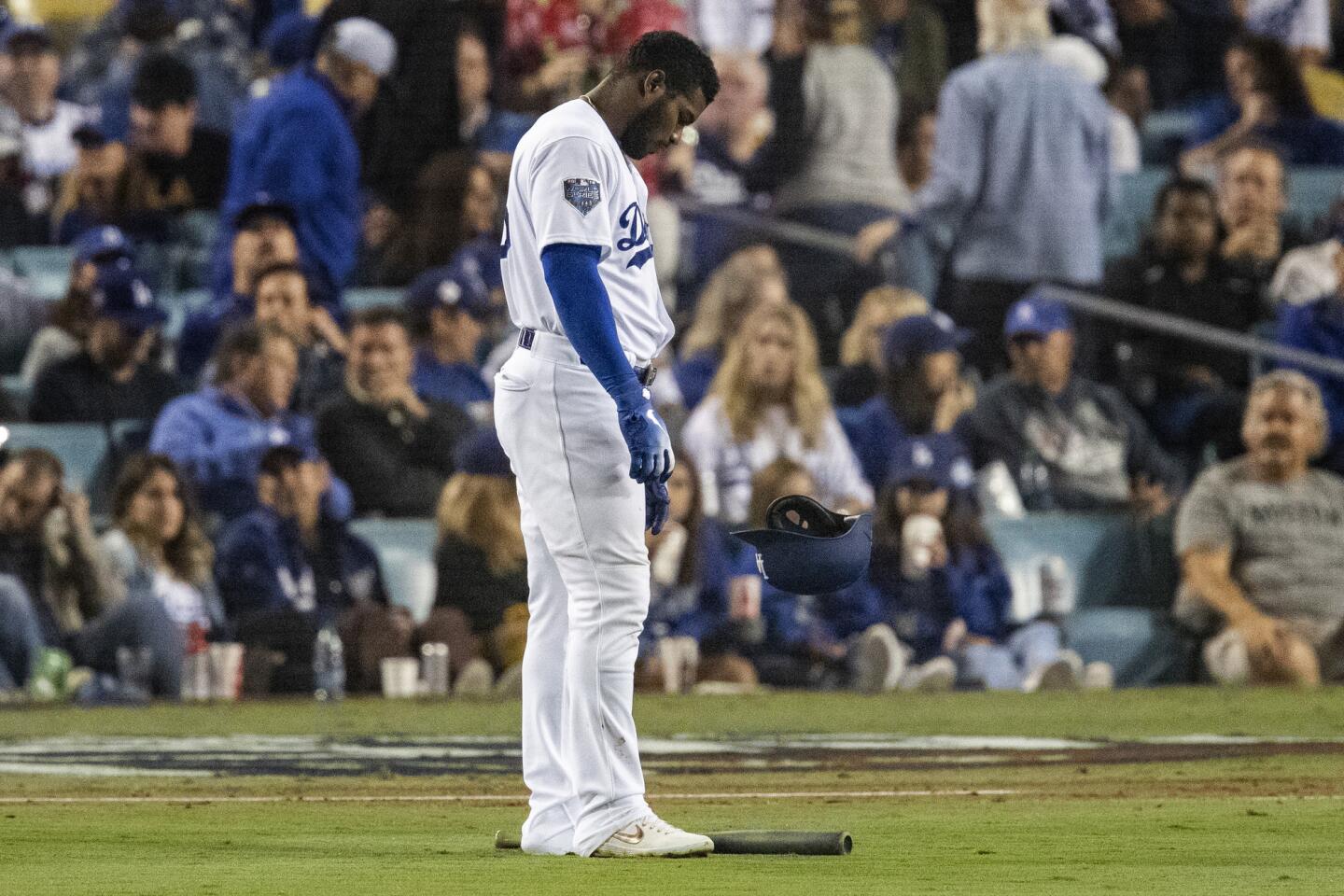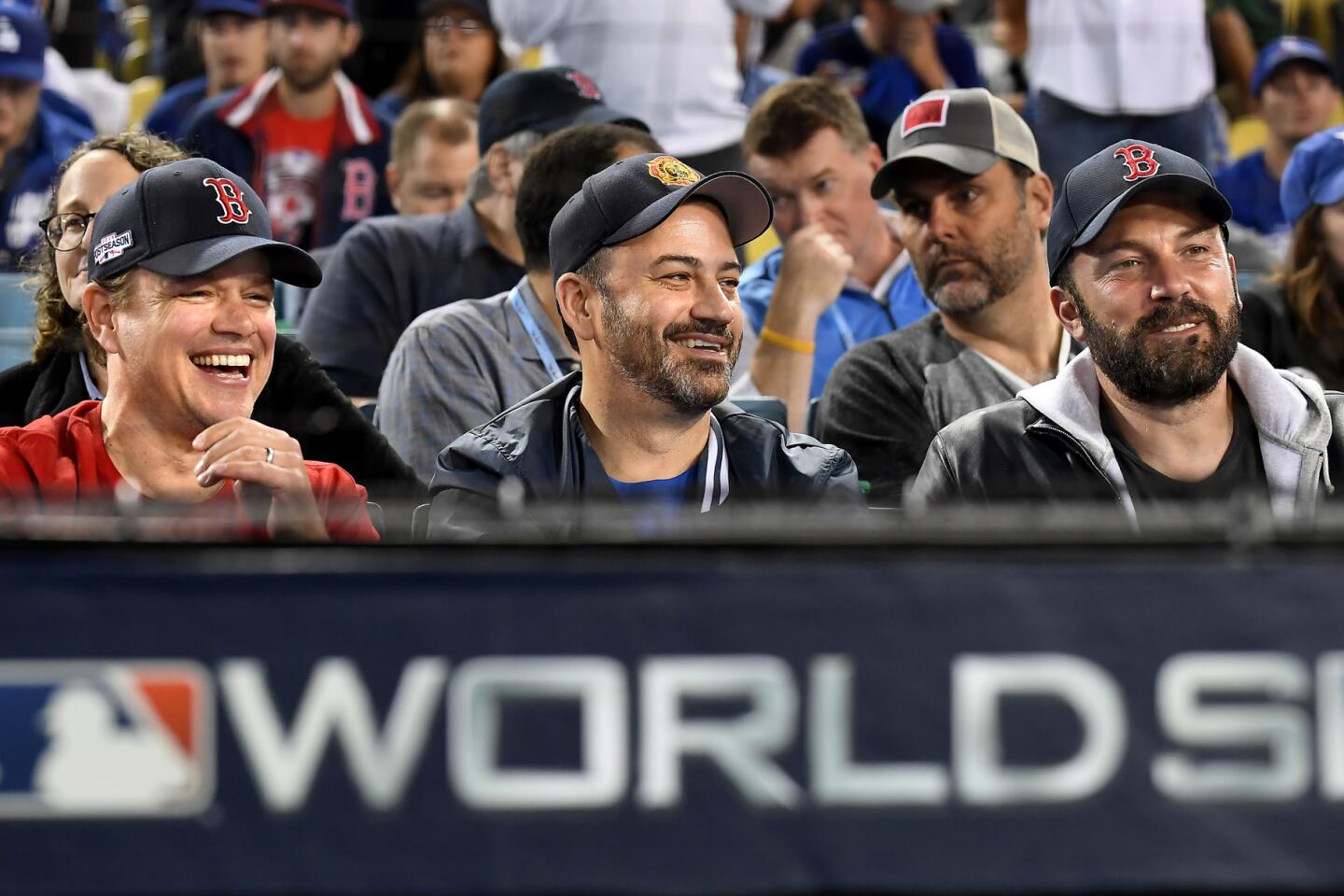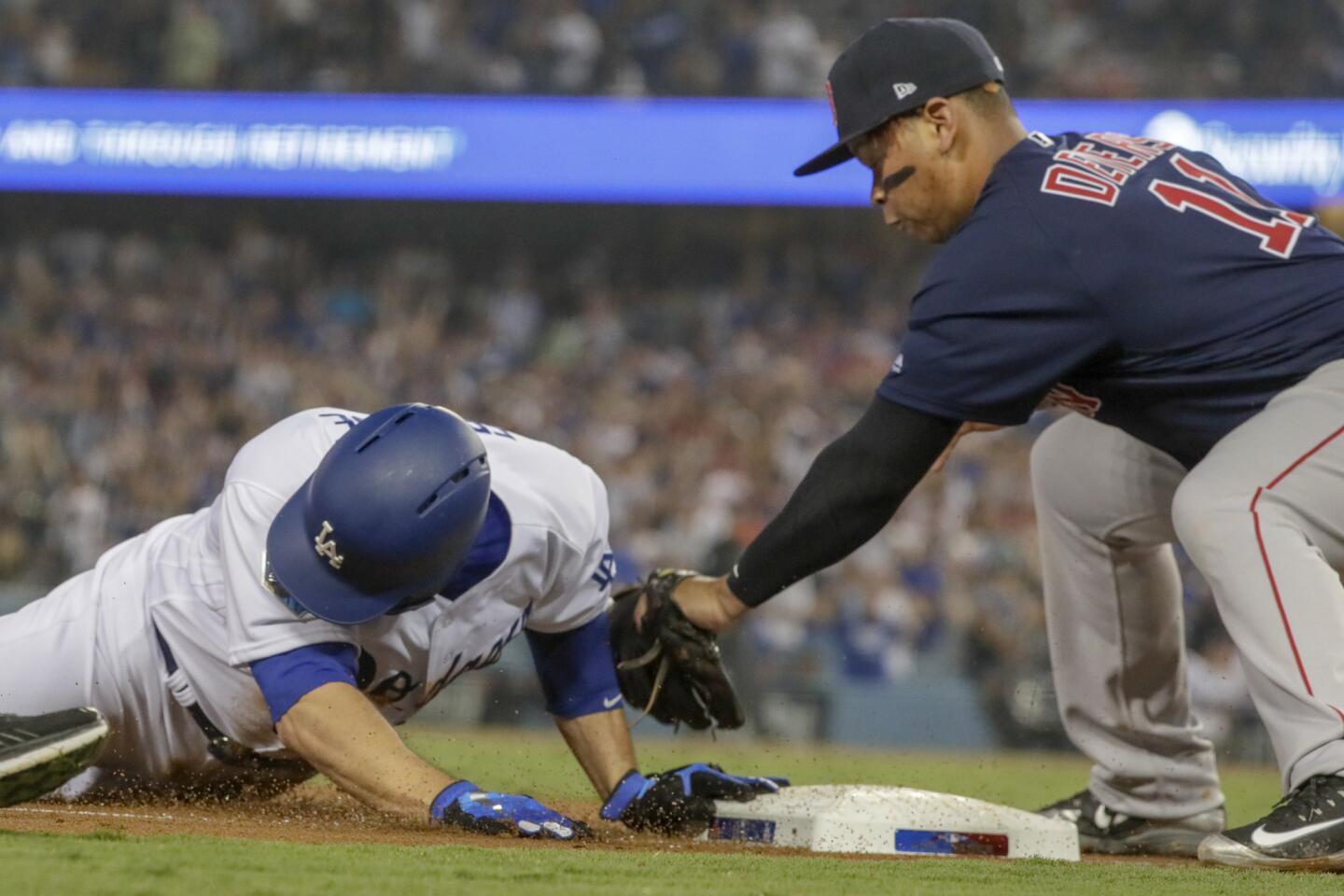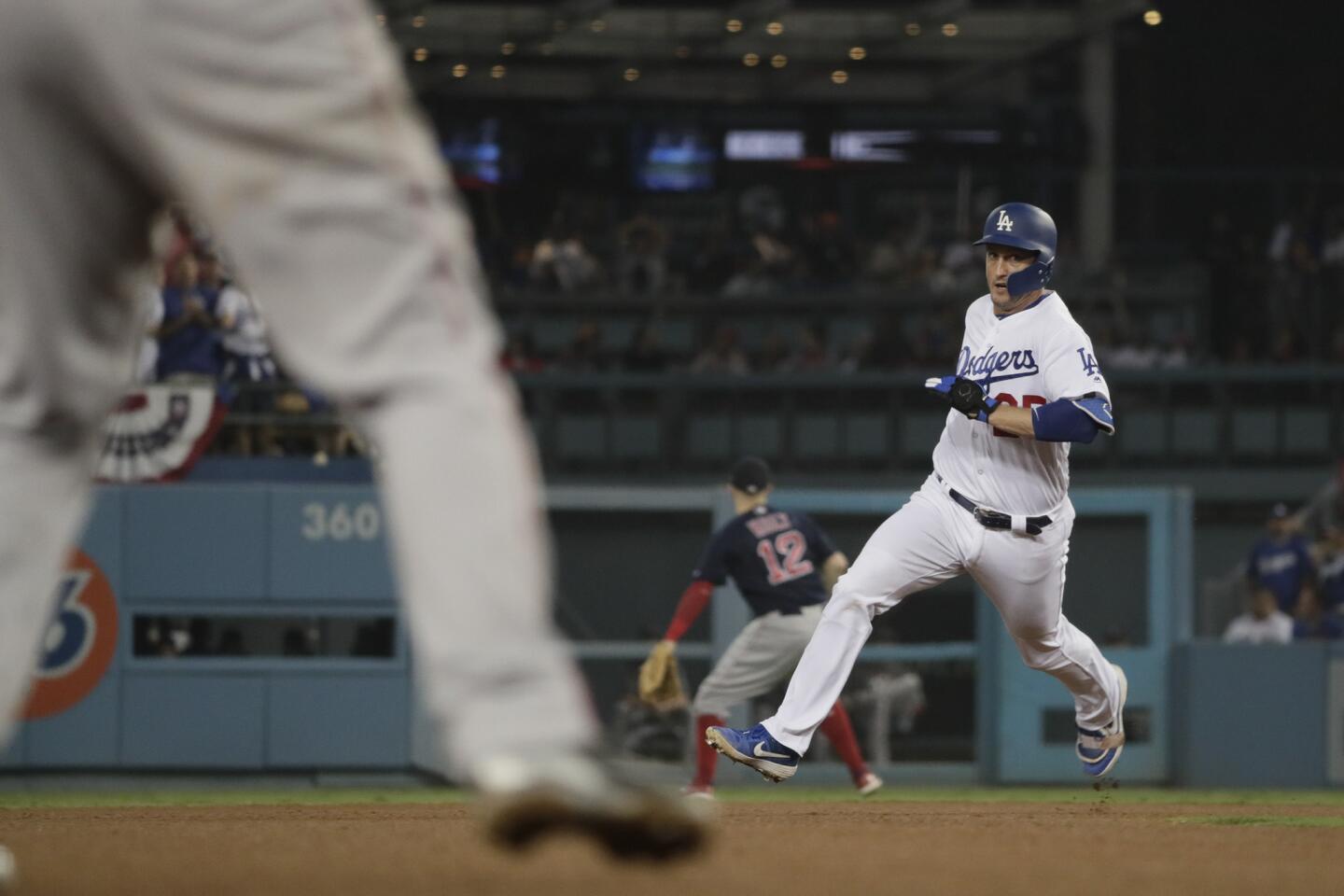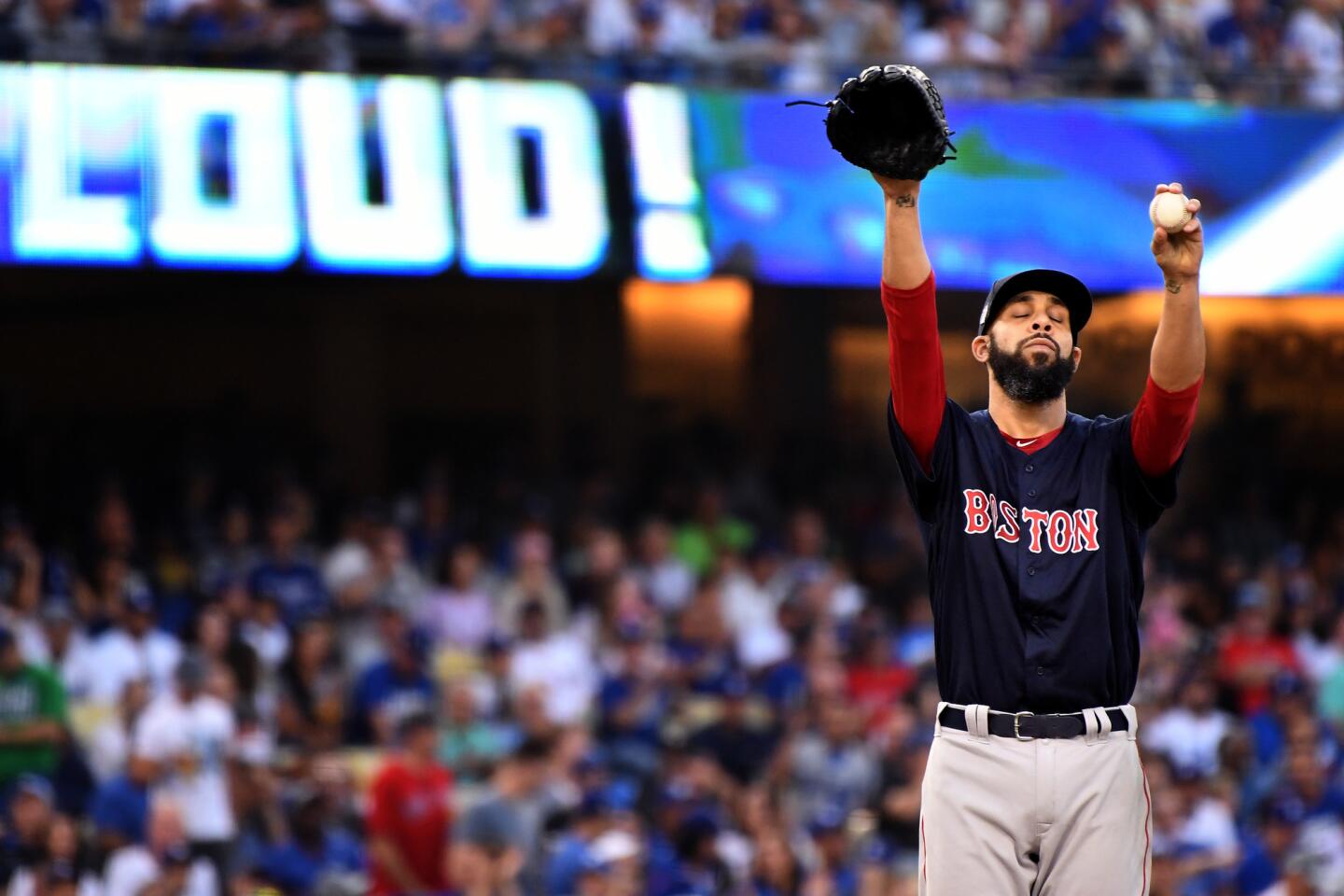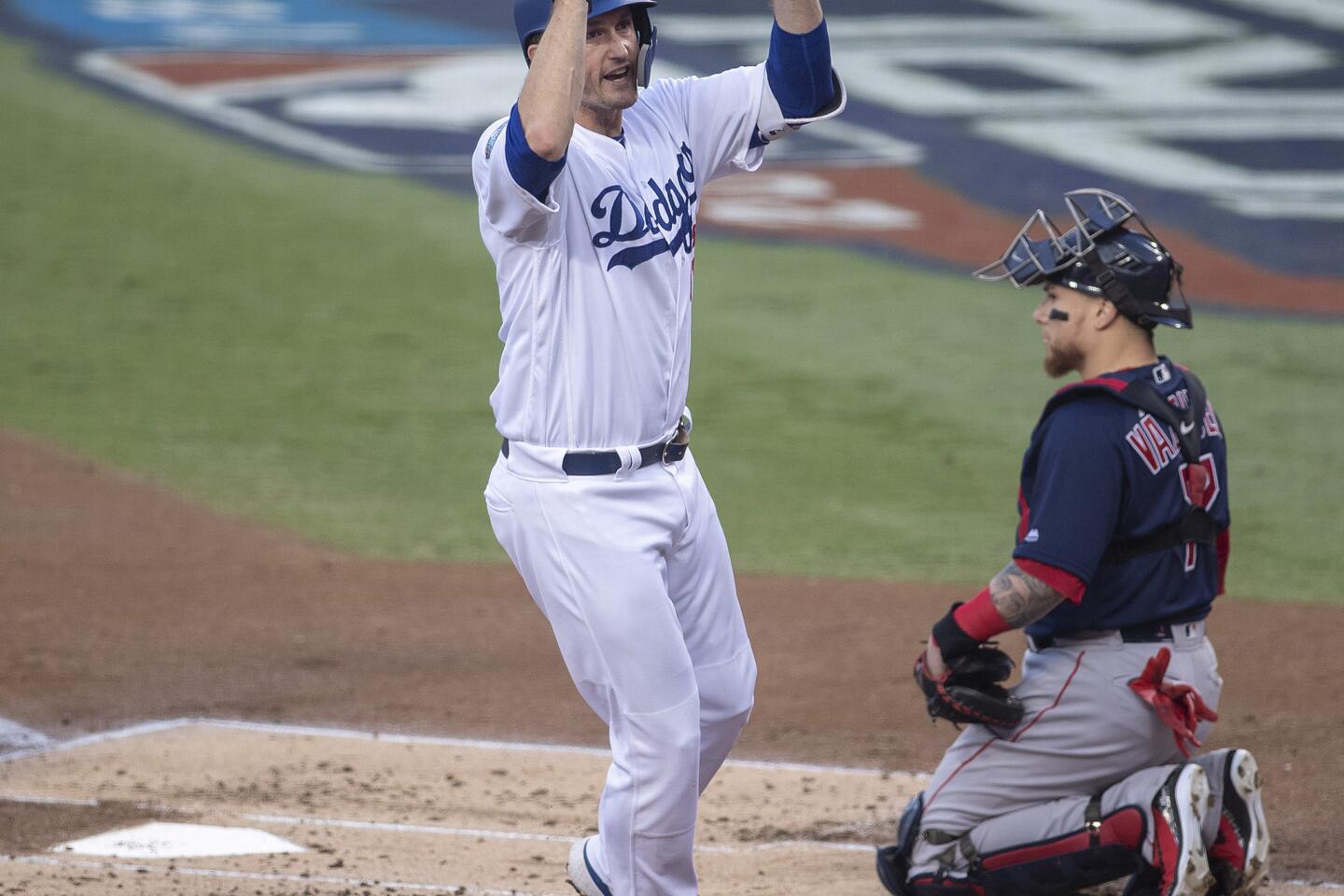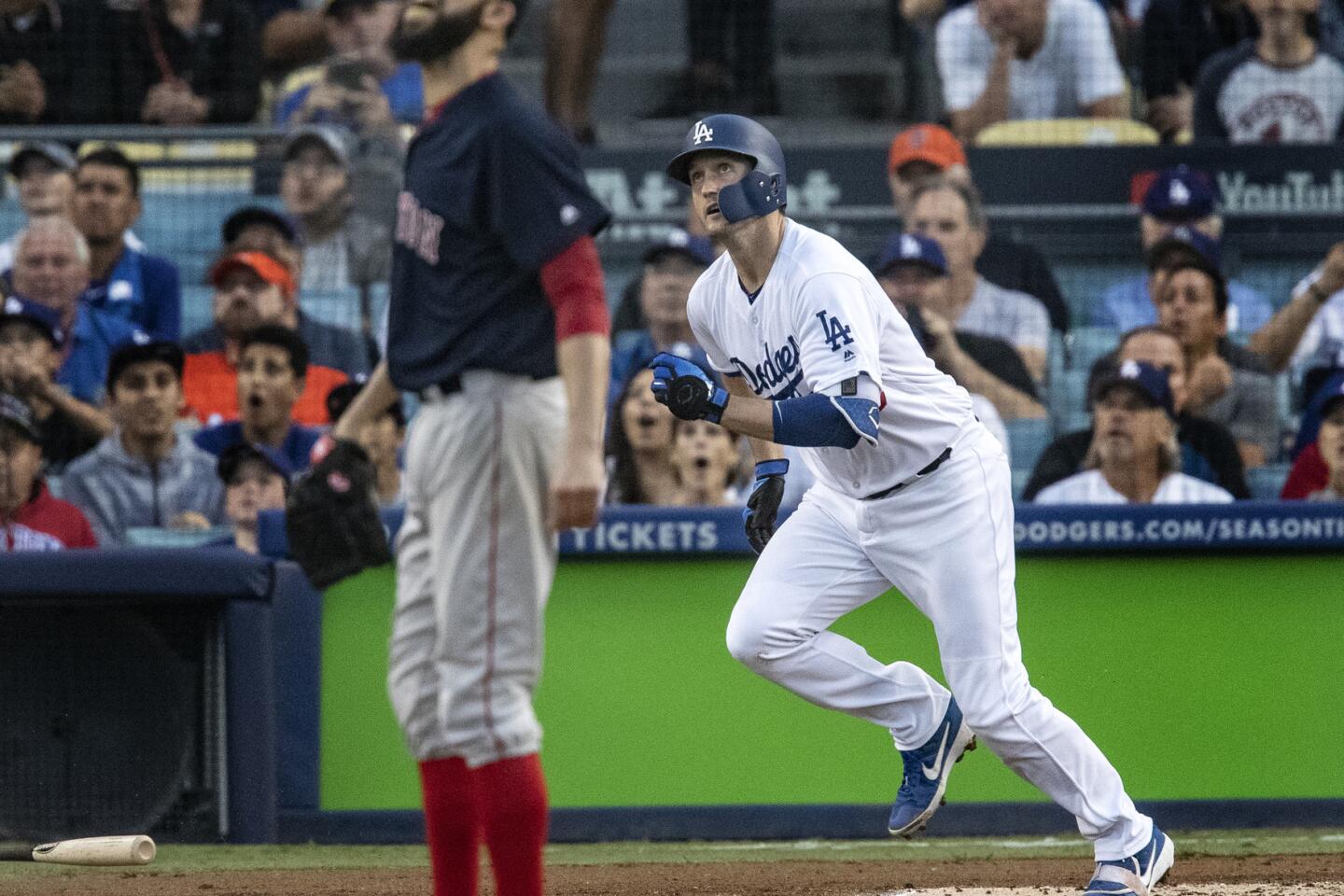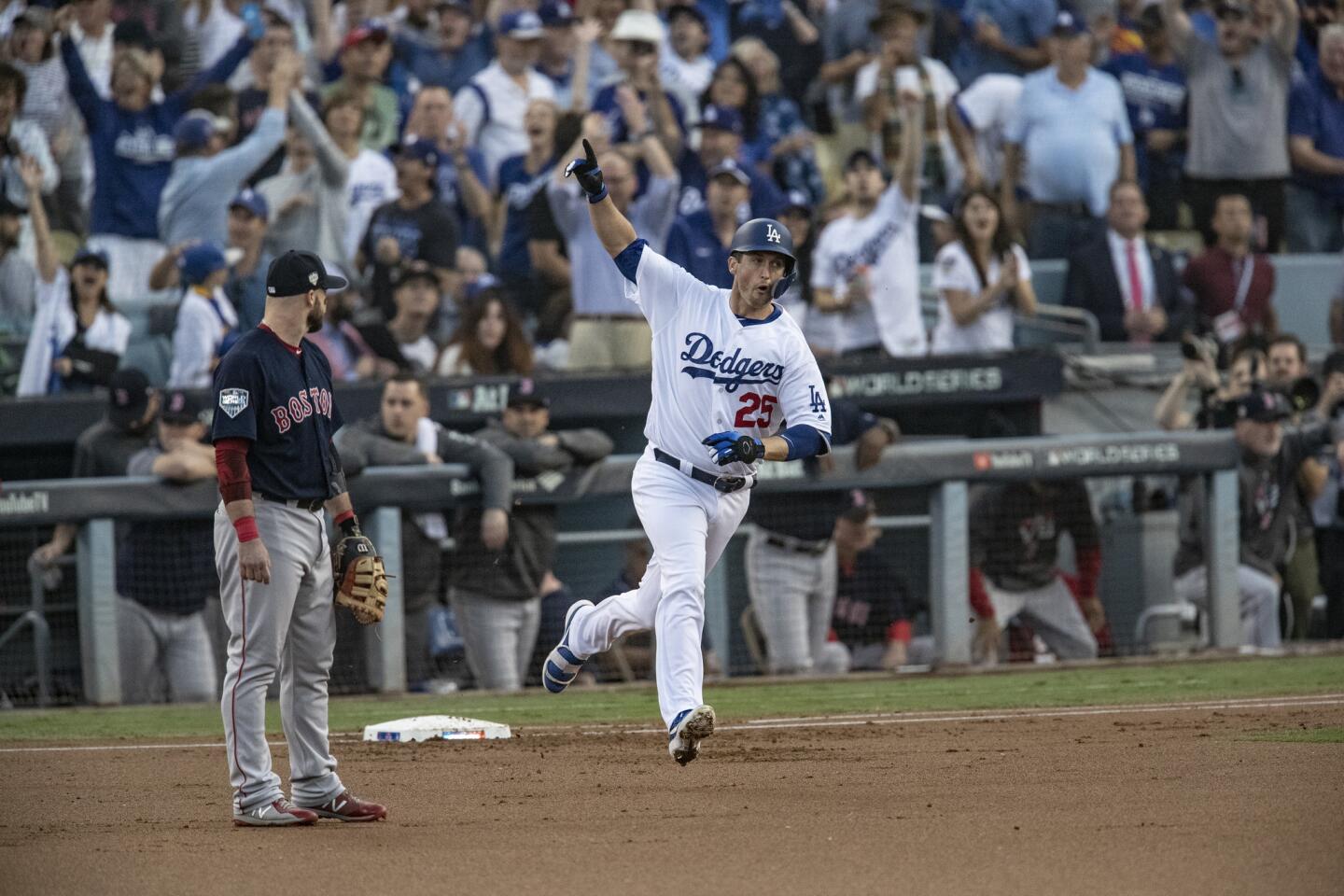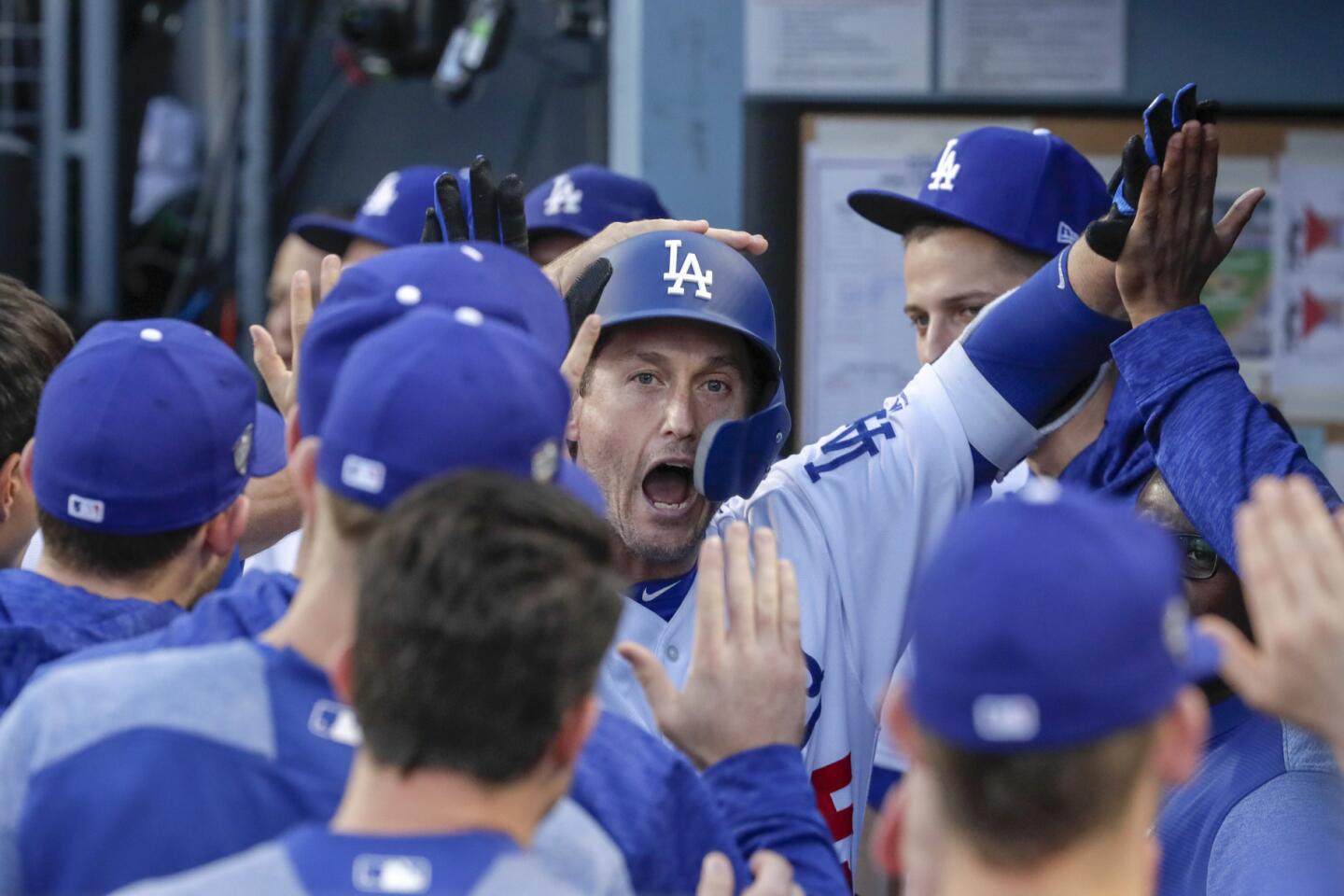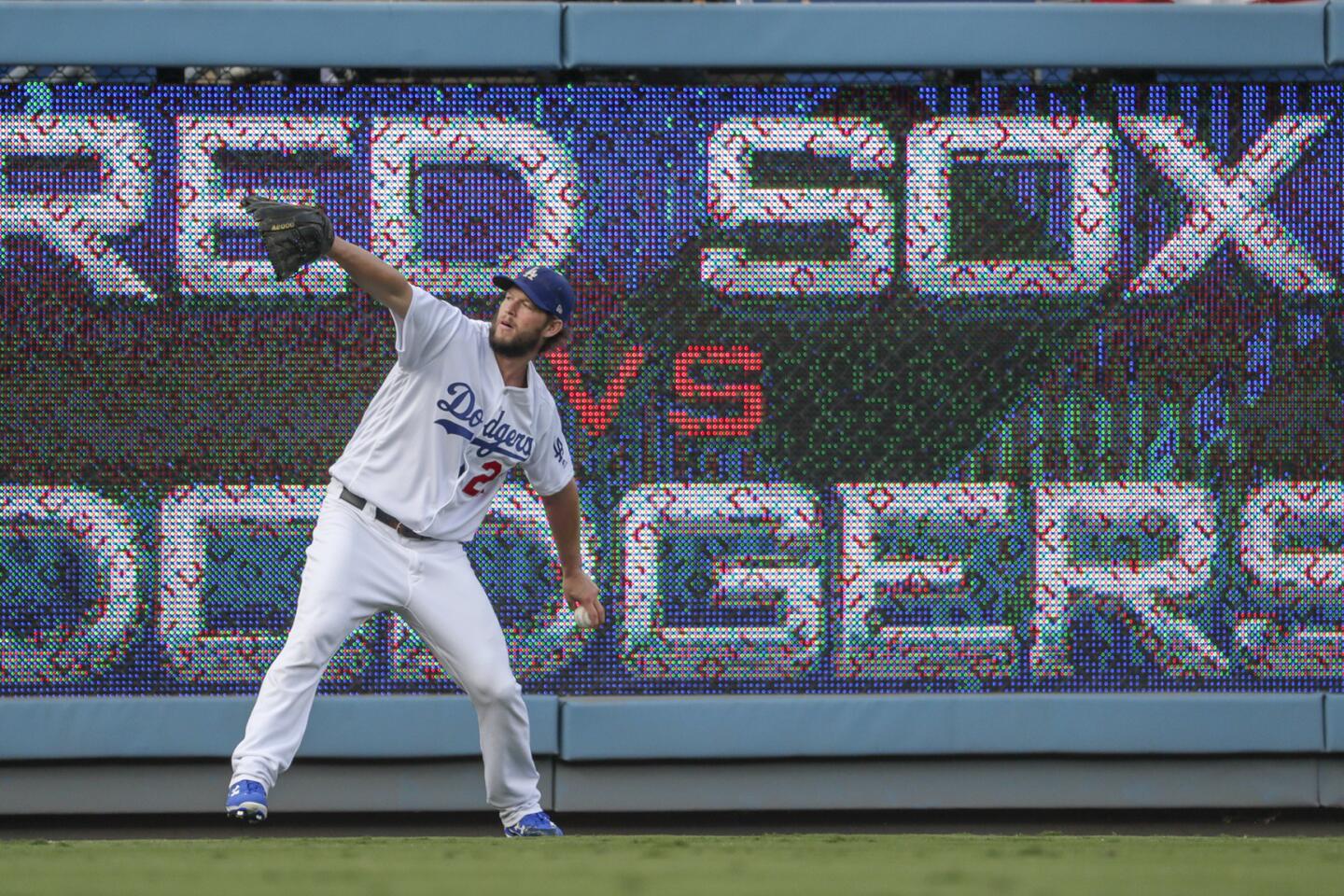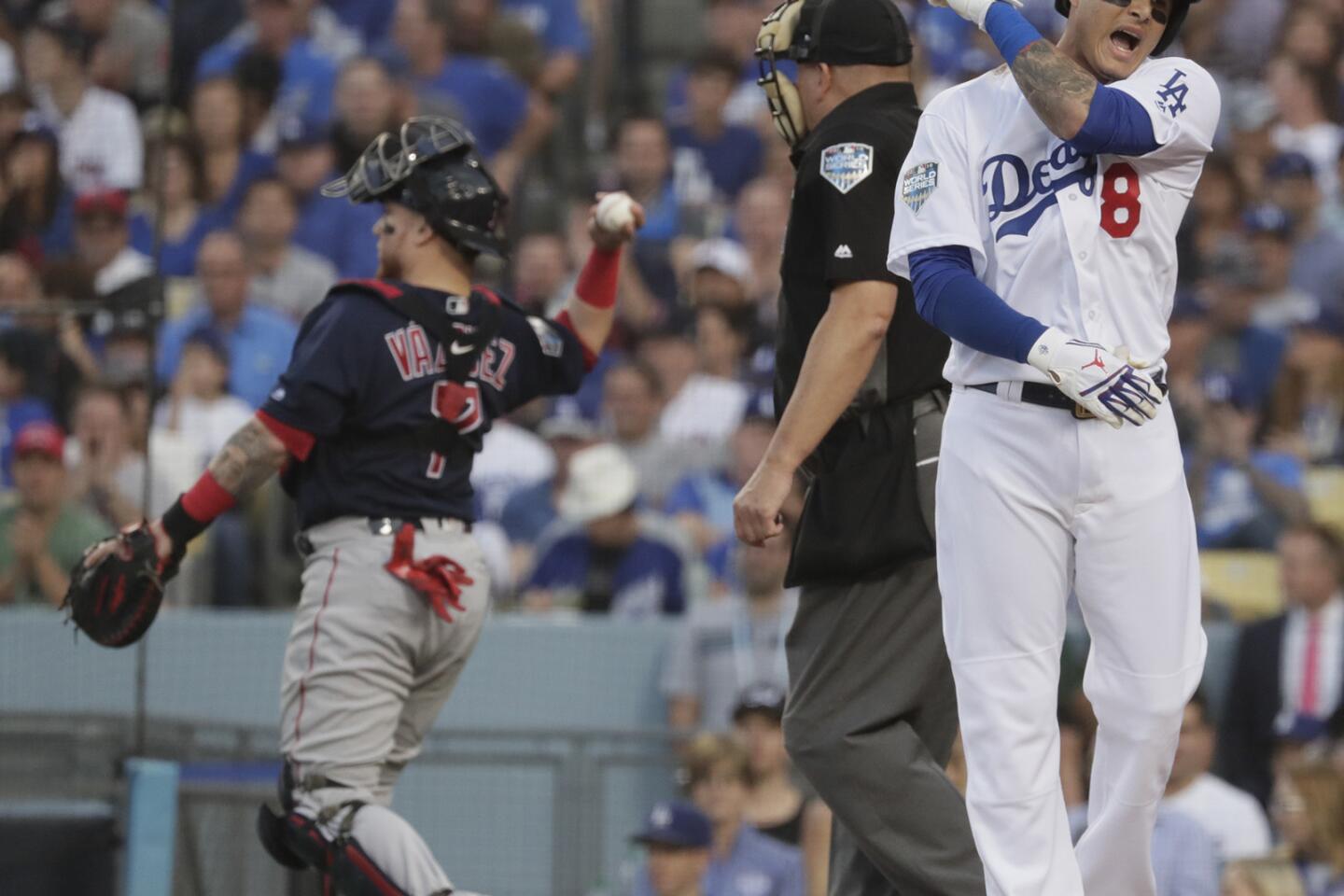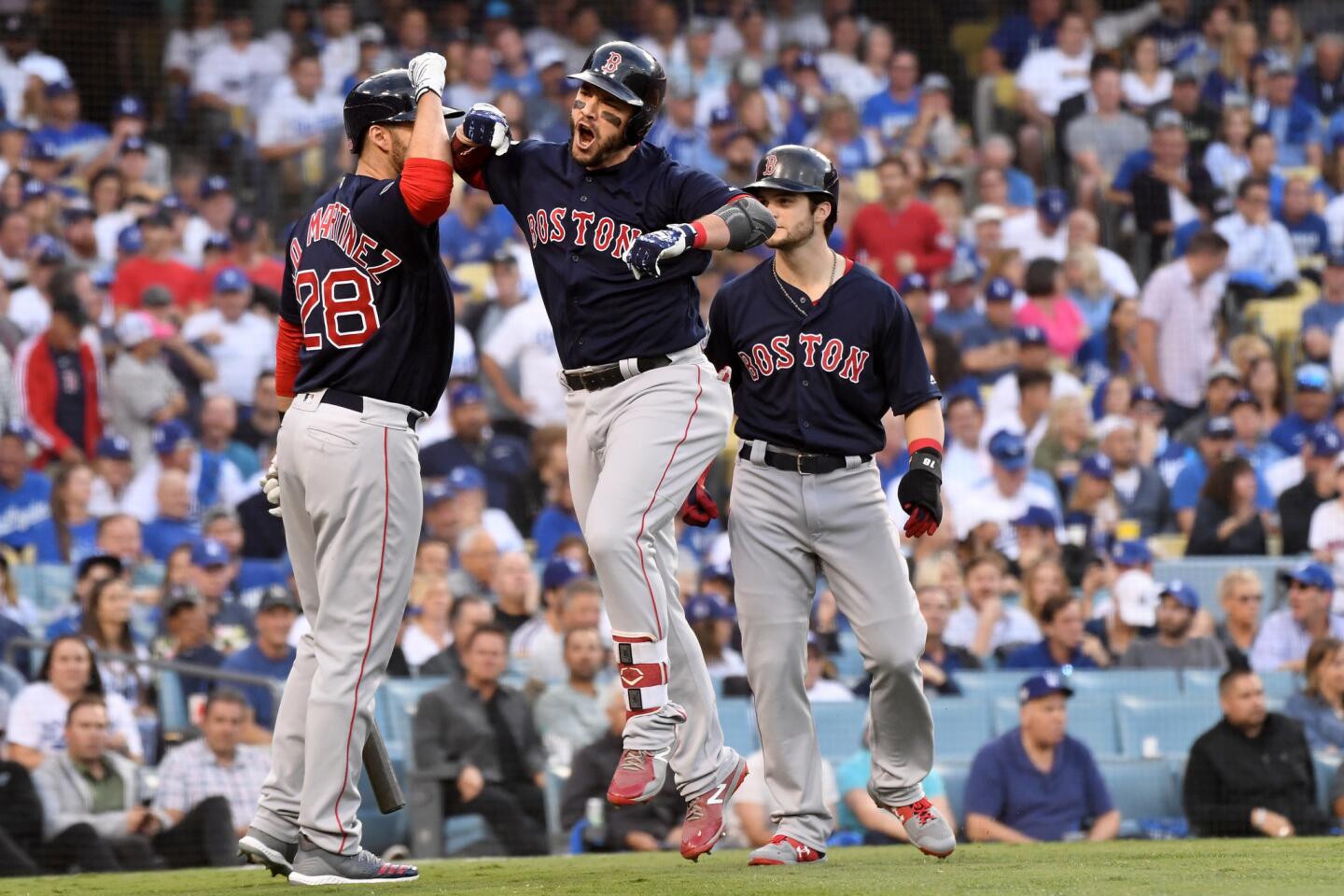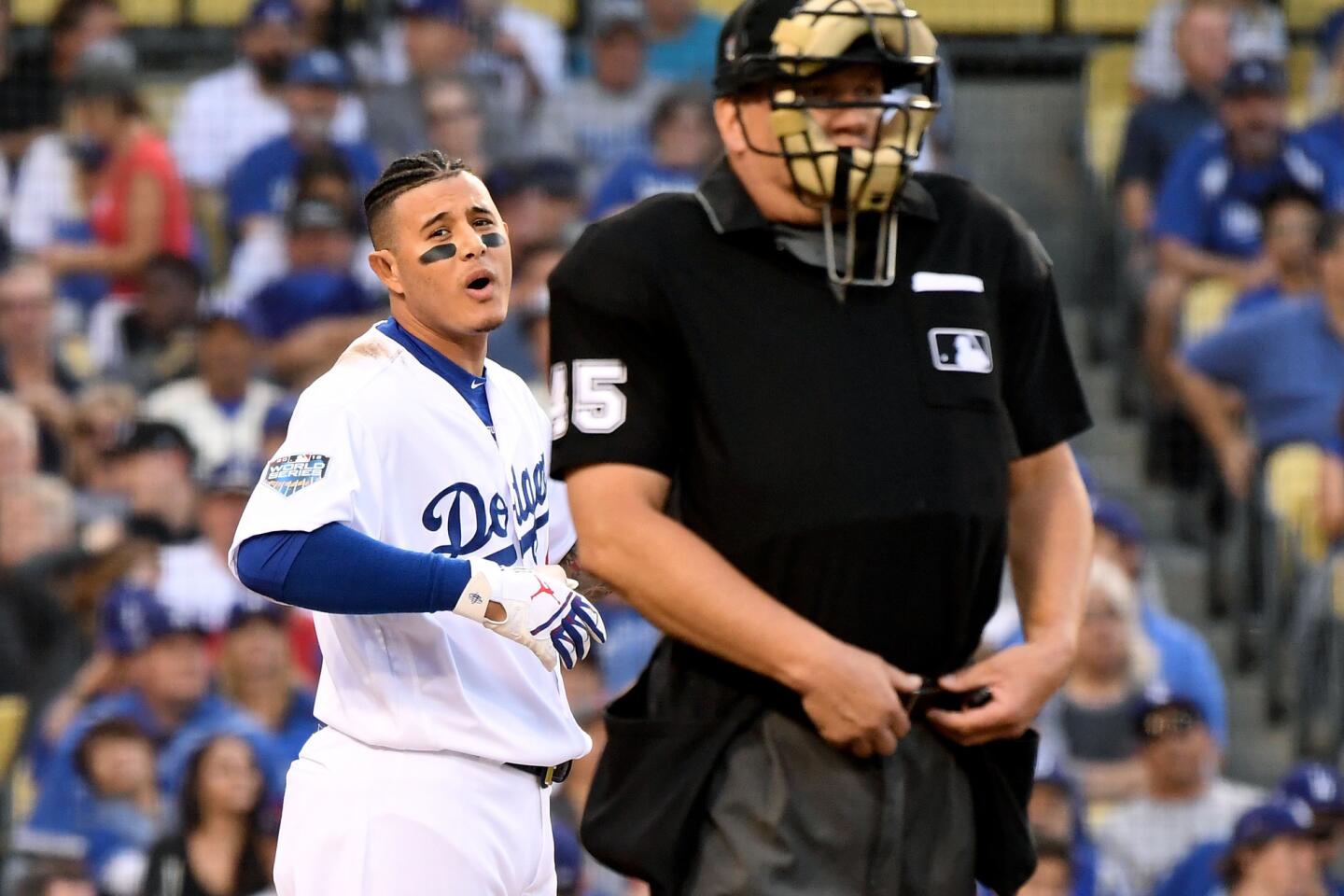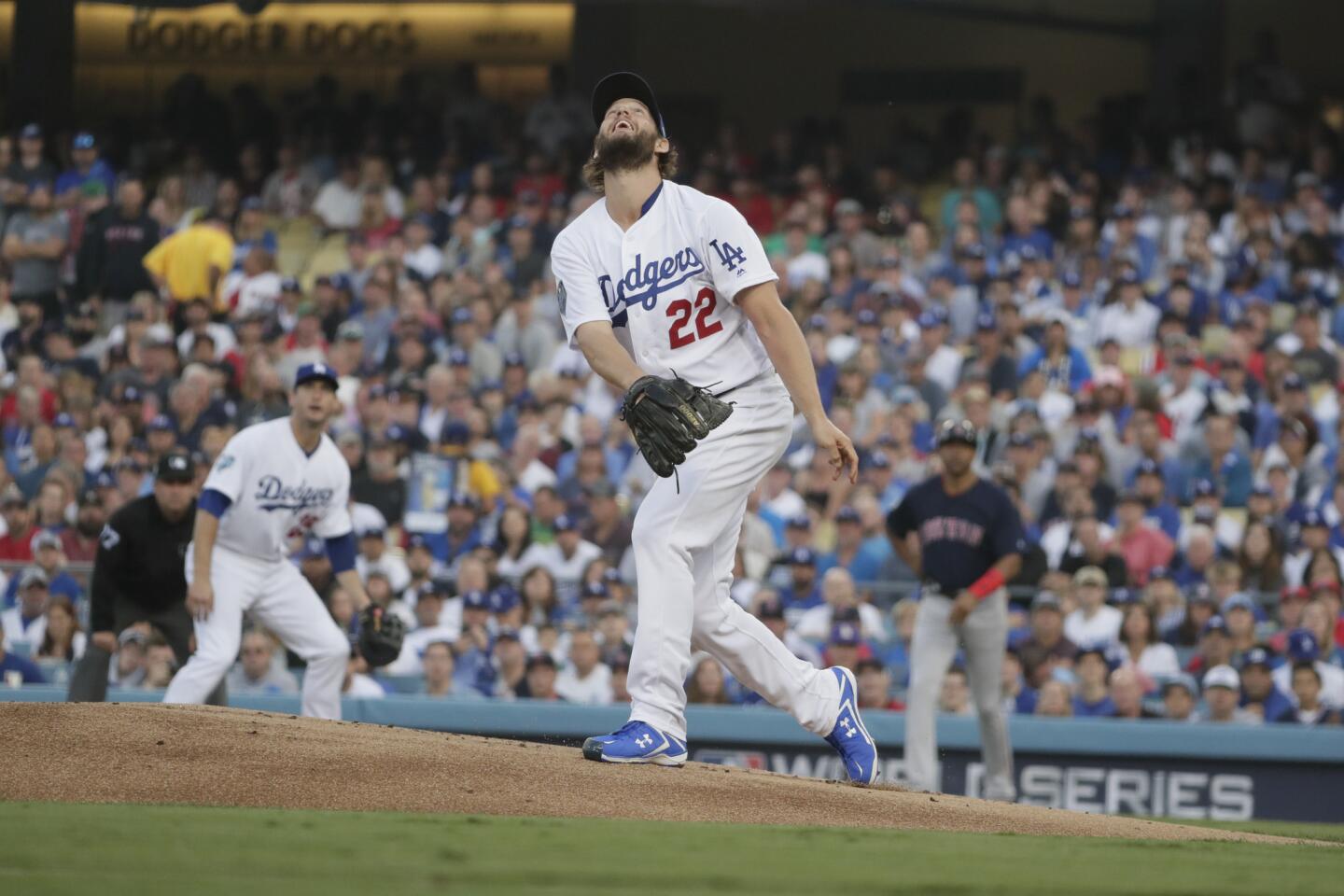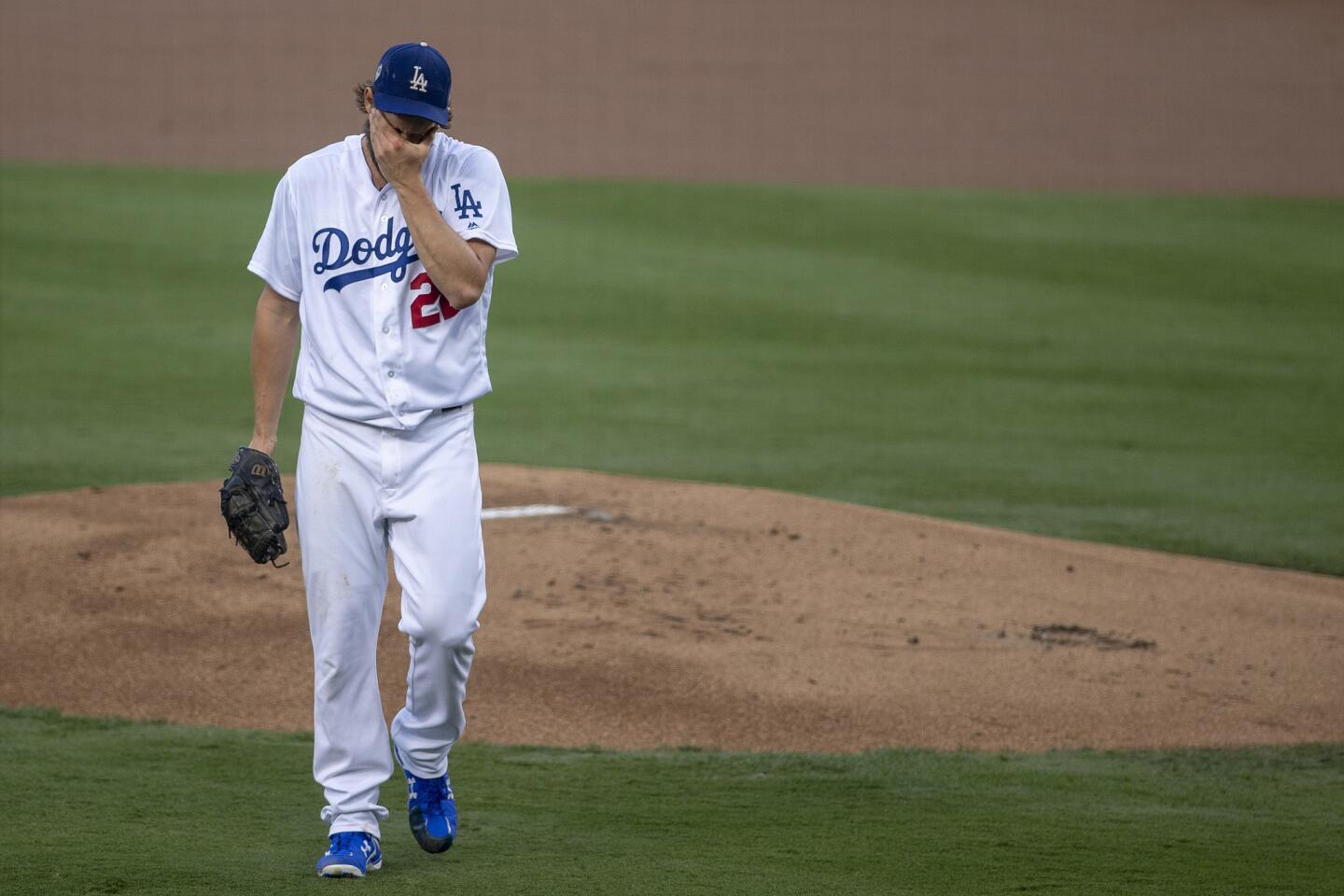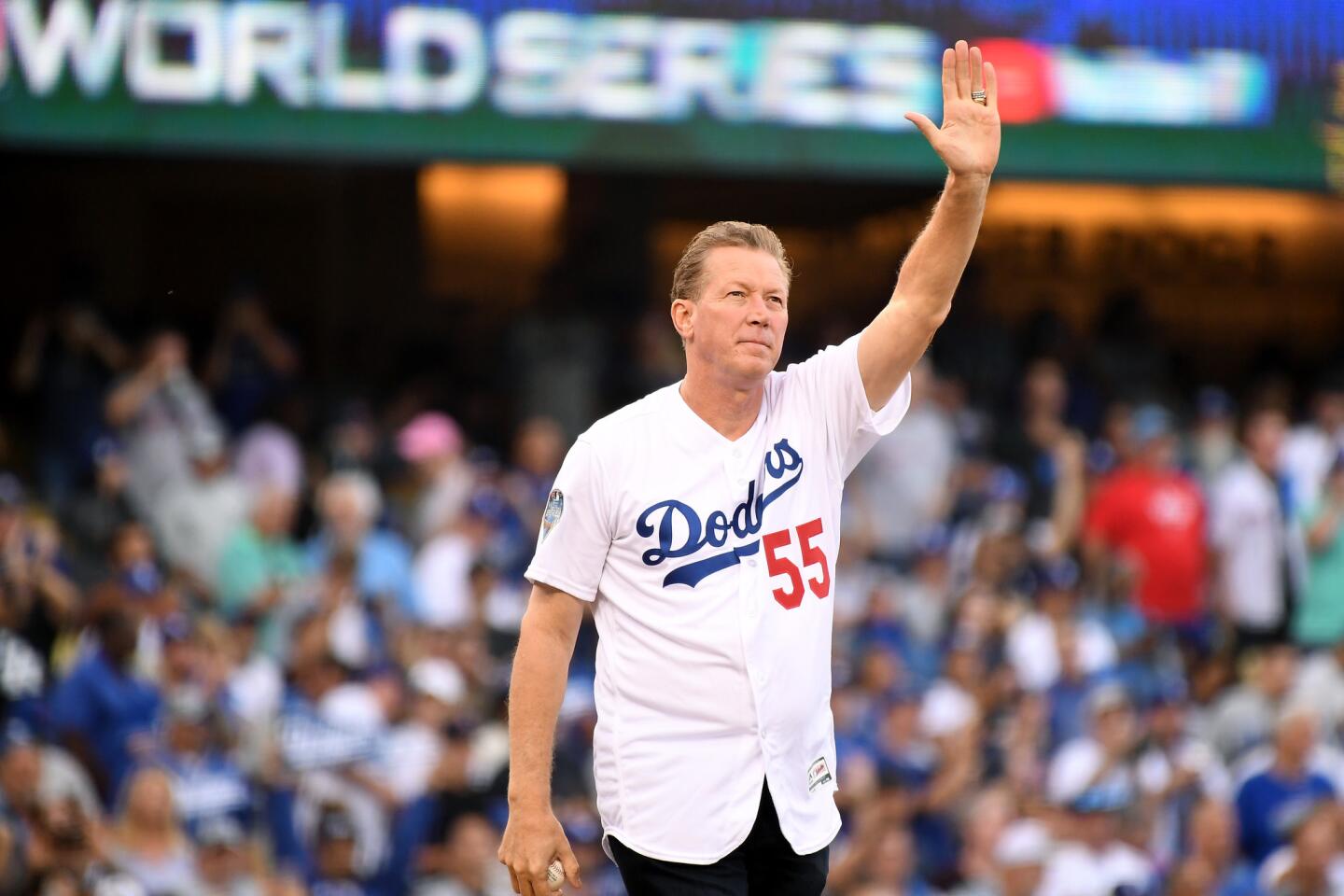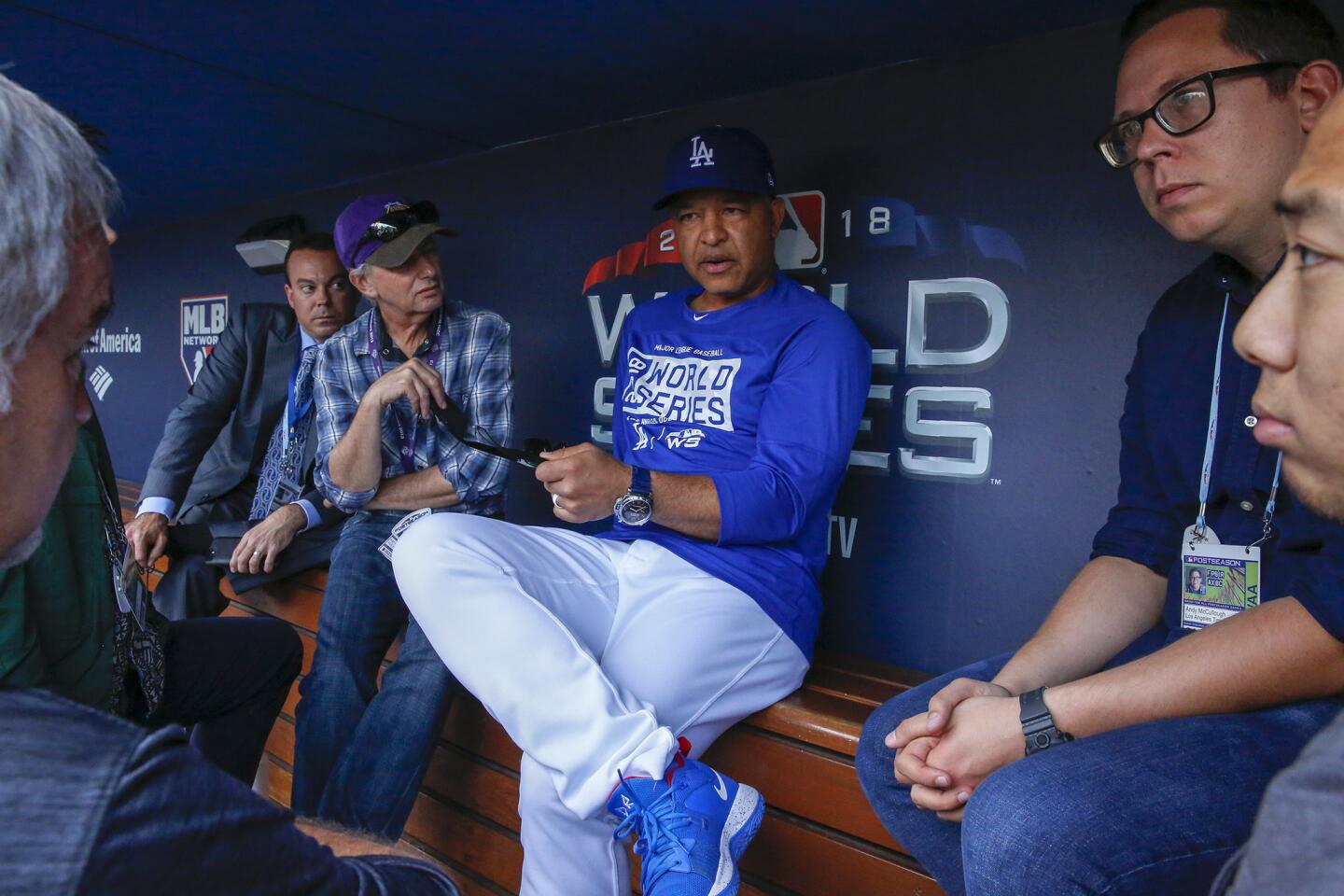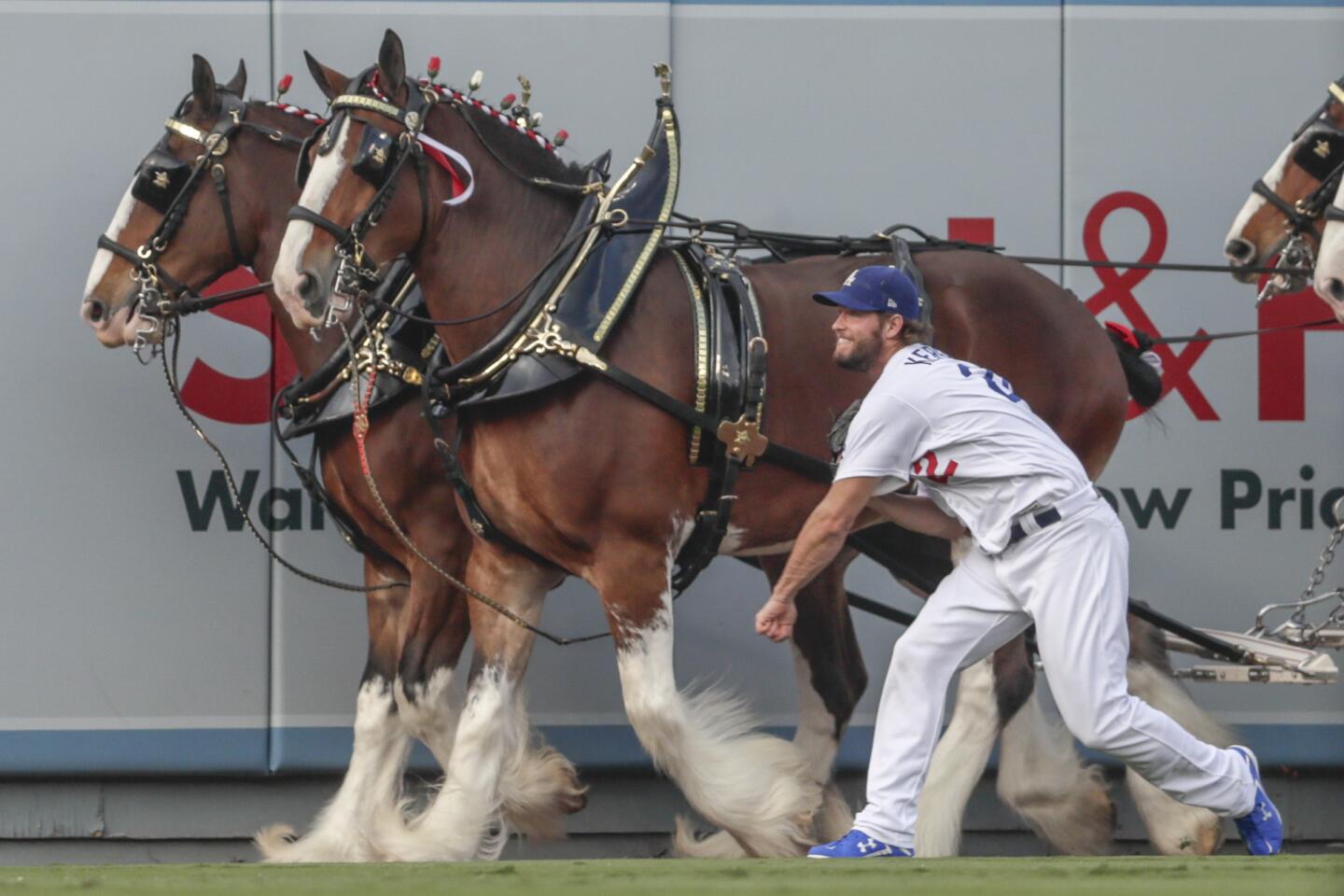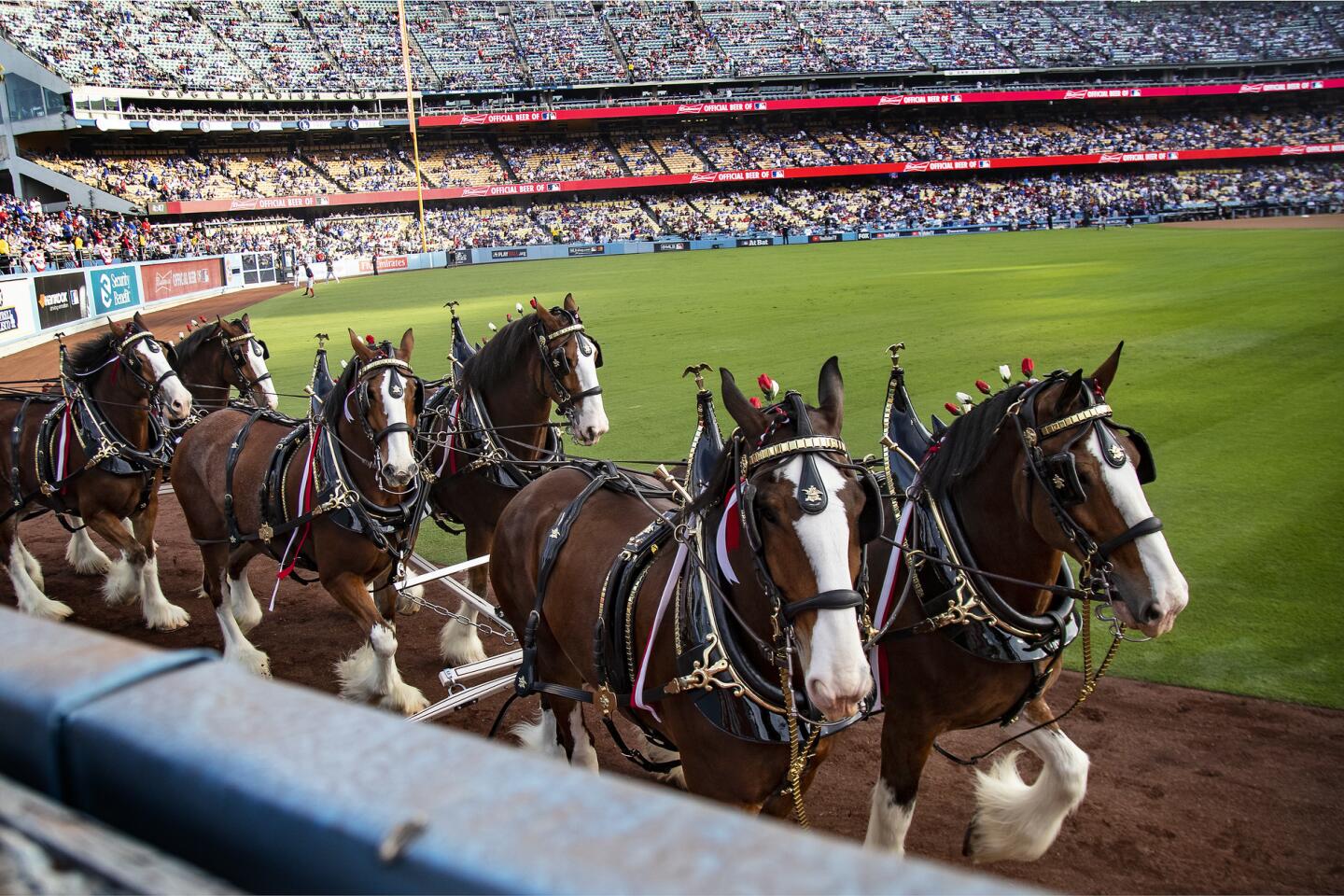Column: October has been the Dodgers’ cruelest month
- Share via
Winter came to Chavez Ravine Sunday night, swiftly, cruelly, blowing in from Boston and burying the Dodgers precisely where they stood.
Clayton Kershaw, frozen on the mound, staring at his shoes. Dodgers batters, motionless at home plate, glaring into failure. Dave Roberts, stuck on the dugout rail, peering into his future.
Surrounding it all was a Dodger Stadium filled with October-bitten fans, frosty in their seats, glaring down at somebody else celebrating a championship for the second consecutive year.
It was all so cold. It was all so familiar.
The Boston Red Sox won the World Series title with a 5-1 victory over the Dodgers in Game 5, capturing the series four games to one and winning their fourth championship in 15 years.
All this, one year after the Houston Astros won the same crown at the same place by the same score with a Game 7 victory over the Dodgers.
And all this, 30 years after the Dodgers’ last World Series title, continuing a drought that is as unimaginable as it is historic.
“It stinks, it hurts, it sucks, it rips your heart out, it really does,” said Austin Barnes in a morbidly quiet Dodgers clubhouse.
It ended with the same hard-to-watch celebration as last season, this time with Boston catcher Christian Vasquez jumping into the arms of giant pitcher Chris Sale as a streaming, dancing bunch of Red Sox completed the hostile takeover by gathering in a giant hug in the middle of the diamond.
It also ended with the same weird sudden takeover of Dodger Stadium by screaming fans wearing a different color, the area behind the visiting dugout filled with red shirts and jackets chanting with a distinctly accented, “Let’s Go Red Sawx.”
“Tough,” said Rich Hill. “Just tough.”
It was same game as last year, really, sadly, the Dodgers falling behind immediately, the place deflated, the comeback rendered hopeless by flailing Dodgers bats and a deadened Dodger spirit.
“It just hurt worse when you make it all the way and get second place,” said Ker- shaw. “So having done that two years in a row now, it doesn’t make it any easier.”
Kershaw, who struggled again in attempting to rewrite his pained postseason legacy, was in trouble by the fourth pitch, a sharp single up the middle by Andrew Benintendi. He was in big trouble by the fifth pitch, a home run blasted over the left-field fence by Steve Pearce.
David Freese countered with a home run on David Price’s first pitch in the bottom of the first, but the Dodgers could manage only two more hits the rest of the game. Meanwhile, the Red Sox piled on with three more homers — two off Kershaw — to finish it.
The night for the autumn-challenged ace, who allowed four runs in seven innings, was illustrated after Xander Bogaerts’ single in the seventh. Kershaw reacted with a move that symbolized the night for his frustrated city. He literally leaped in disgust.
“Anytime you lose the last game in the playoffs, it’s no fun,” Kershaw said.
In the final innings, even though the deficit was still manageable, the game felt so over that all those Red Sox fans immediately turned their attention to a real rival, chanting, “Yank-ees Suck Yank-ees Suck.”

Los Angeles Dodgers manager Dave Roberts discusses Clayton Kershaw and losing the World Series.
“We did the best we can, we left it all on the field, but we fell to a better team in Boston,” said Yasiel Puig.
Well, most of them left it on the field. The game ended appropriately with a kneeling strikeout of Manny Machado, who didn’t seem particularly interested all night, who failed to hustle throughout the postseason, and whose celebrated midseason acquisition proved to be a bust.
Machado will be a free agent this winter. Please, Dodgers, do not even think about bringing him back.
The Dodgers’ front office combo of Andrew Friedman and Farhan Zaidi will be facing other big off-season questions, the main one being, how can they keep this from happening again?
It’s great that they reached the World Series in consecutive seasons for the first time in 40 years, but the city is through being excited over participation medals. For all their glory in winning six National League West titles in a row, they need to figure out how to finish the job when it counts most.
“We just have to get over that hump and win that last series of the season,” said Matt Kemp, whose brilliant Dodgers comeback season burned out at the end.
The Red Sox won because they were clearly the better team. The Dodgers lost because, though they were good enough to beat essentially mediocre Atlanta and Milwaukee in the National League playoffs, they did not have the roster or utilize the strategy to compete with an elite, 108-win squad that finished the season with baseball’s best record for a reason.
“Just a little bit too much for us,” said Roberts, and that’s being kind.
The two main issues for the Dodgers in this series were the bullpen and the offense, both of which could benefit from a change in their celebrated analytic approach.
The Dodgers never fixed their midseason bullpen issues with veteran stoppers, instead trying to rely on journeymen, and that bullpen figured in three of the four losses.
The Dodgers also insisted on changing lineups seemingly every day during the regular season to afford the best possible matchups, and though that worked over a long summer, it failed them in this short series, which often featured their best power hitters on the bench.
“It might not be a personnel thing,” countered Kershaw. “It might be a play better thing,”
But the decisions will start with personnel, which will start with Kershaw, who can opt out of the final two years of a contract with $65 million remaining and seek a richer deal. Despite his spotty postseason record, Kershaw is still one of the best pitchers of his generation, and still effective over the course of a season, so the Dodgers should keep him for the sake of history and continuity, which have long been lacking in the organization.
Then there is the case of Roberts, who, judging from the boos showered upon him during pregame introductions Sunday, will be considered the villain of this series for three questionable pitching changes that led to three losses.
The option on Roberts’ contract for next season has not yet been picked up, but it will be, and should be, because his mistakes do not outweigh the leadership he has shown while dealing with an extremely proactive front office and disjointed clubhouse culture while reaching two World Series in his three seasons.
As for everyone else, well, right now everyone else is suffering, again.
“These hurt, this hurts. I don’t think people understand how much it hurts for each player to get this close,” said Barnes.
Players, and fans, and a city, all hurting, 30 years of hurting, so tired of bundling up, so weary of waiting for spring.
Get more of Bill Plaschke’s work and follow him on Twitter @BillPlaschke
More to Read
Are you a true-blue fan?
Get our Dodgers Dugout newsletter for insights, news and much more.
You may occasionally receive promotional content from the Los Angeles Times.

